Lorna


Lorna


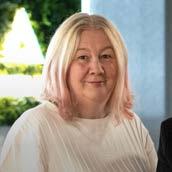 Foreword Lorna McAdoo
Group Director, Environment, Social & Governance at Version 1
Foreword Lorna McAdoo
Group Director, Environment, Social & Governance at Version 1
Anyone employed in any tech role whether in public, private or third sector locally should feel incredibly proud of what we have achieved in Northern Ireland over the last few decades, but we should also be hugely excited about our future.
Through working together we can make NI a destination of choice to start a tech business, invest in growing a business, as well as a platform for collaboration to develop tech for good.
I am always incredibly blown away by what we are doing in tech, and for years we have talked about wanting (or rather, needing) to get more women into our sector and this year’s Women in Tech Awards was the perfect opportunity to witness this first-hand. This year, we celebrated the great work of Clare McGrath and her team at St Malachy’s School. The opening of their Digital Technology Hub is not just about creating a passion for tech in our local communities and young people, but it is using it in such a way as to build bridges and breakdown cultural barriers – it is showing how tech can drive inclusivity. There were so many fantastic nominees and winners across all the categories on the night and these awards have helped us to realise we already have many incredible women in tech here – we just need to promote and celebrate them more!
For me, the power is in collaboration, not in competition and having the pleasure to sit on the board of Software NI has
only reaffirmed my knowledge that we all want to make this a sector to be proud of, and we can only do that by joining forces.
To this end, we must all work together to influence, support and drive our talent needs, from education through to employability, and ensure that in the process no one gets left behind.
We often refer to Northern Ireland as ‘our wee country’ and whilst many might laugh at our size, we have shown throughout history that we are a powerhouse when we get it right. This ‘wee country’ is full of opportunity and hope and I firmly believe that, as employers, we all need to work with the public sector but also recognise the importance of social enterprise organisations to develop new routes to employment in our sector, particularly for those who just need someone to believe in them. Our education system has delivered so many fantastic people, but it has also limited some in what they can achieve and as a result, they can feel left behind or inadequate.
Therefore, it is essential that we look at how we can help to develop employability skills, we must mentor and support those that need a helping hand or create employment opportunities in our organisations that allow them to get started. There is so much we can do together and show other countries how we not just deliver the best solutions or technologies here, but we have driven it through inclusivity and without ego!
About Sync NI
Sync NI is proud to be the voice of Northern Ireland’s vibrant technology and business sector.
The Sync NI website and magazine brings readers the latest tech and business news, views, jobs and events in Belfast and beyond.
Sync NI Contacts
Editorial Phone: 028 9082 0947 Email: team@syncni.com
Advertising & Partnerships
Phone: 028 9082 0947
Email: louis@syncni.com
General Enquiries
Sync NI
Rochester Building 28 Adelaide street
Belfast
BT2 8GD
Phone: 028 9082 0947
Email: team@syncni.com
Online: www.syncni.com
Copyright No part of this publication may be reproduced without the written permission of the copyholder and publisher. Sync NI accepts no responsibility for the accuracy of contributed articles or statements appearing in this magazine and any views or opinions expressed are not necessarily those of Sync NI, unless otherwise indicated. No responsibility for loss or distress associated to any person acting or refraining from acting as a result of the material in this magazine can be accepted by the authors, contributors, editors or publishers. Sync NI does not endorse any goods or services advertised, nor any claims or representations made in any advertisement in this magazine.
Staff engagement: finding the balance to maintain… balance
“PA is passionate about Catalyst’s Generation Innovation programme and supporting young people in Northern Ireland”
ESO Belfast: A day in the life of a Cyber Security team
STEAM Studio set to inspire NI's young tech talent of the future
CyberFirst holds inspiring EmPower Girls event at Windsor Park Stadium in first event of its kind in Northern Ireland
Hayley Rice: “Coding was a culture shock at first but I have fallen in love with it”

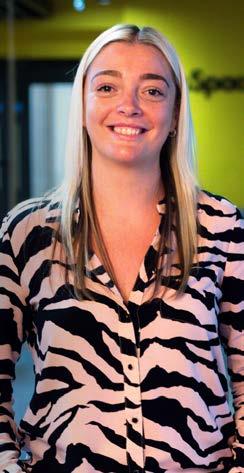
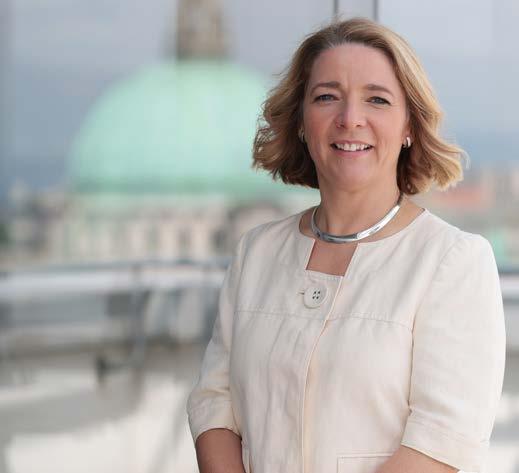
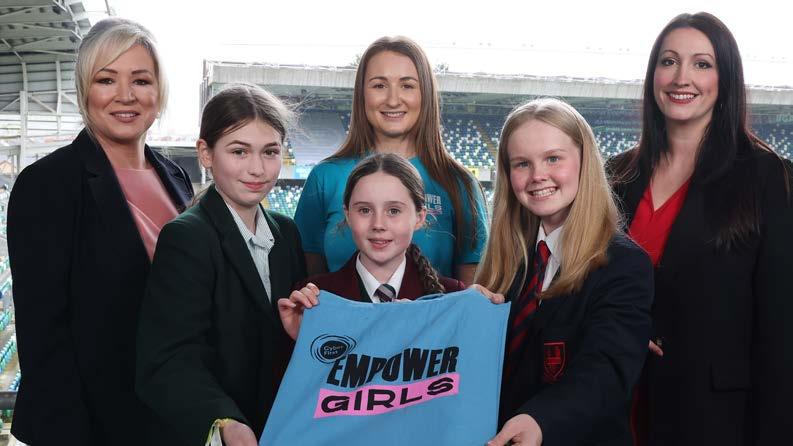

Fernanda Valeiro Soares hails inclusive culture at Version 1
“Clearly communicating CME’s company's mission and values helps employees understand their impact”
Roundtable: Why FDI’s Invest in Belfast
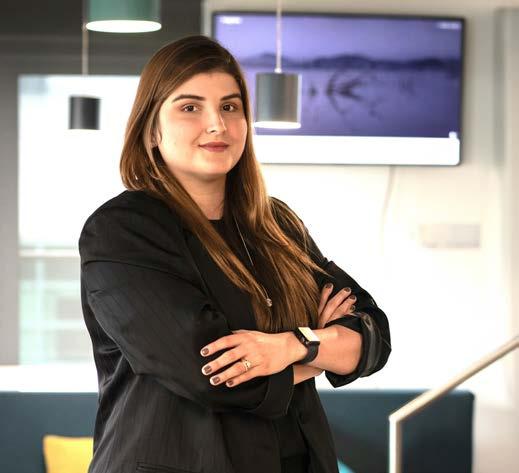
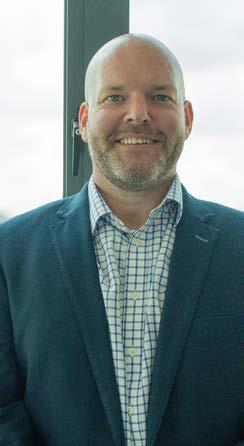

“Having low numbers of females in STEM is a repetitive cycle that needs to be dealt with”
2024 Women in Tech Awards recognise NI’s digital trailblazers
Meet Michael: A Solution Engineer championing change at Liberty IT
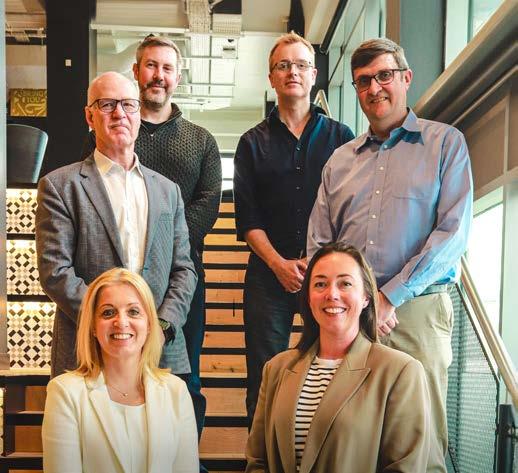
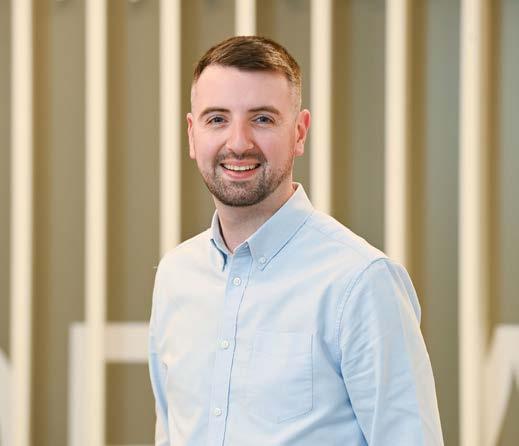
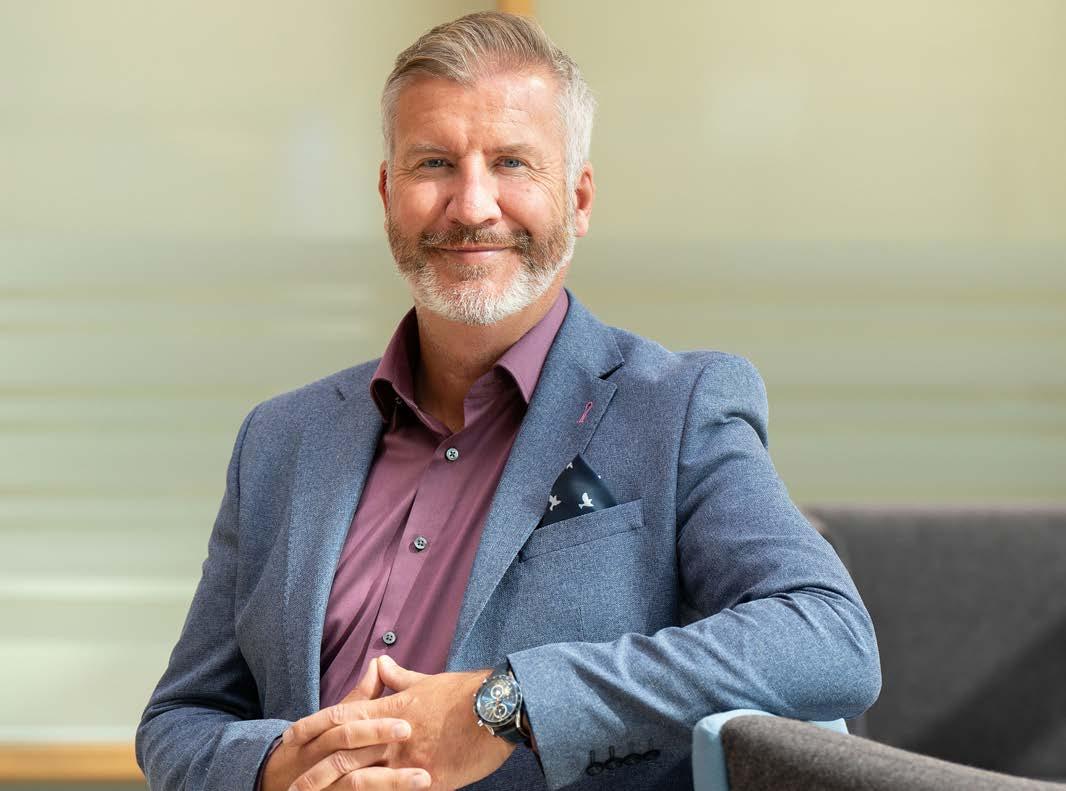
Rob McConnell, Head of Expleo NI, explores why staff engagement in the technology industry is such a hot topic right now, and what business leaders can do to find the balance between being a flexible employer whilst maintaining a focused and productive workforce
Staff engagement is one of the hottest topics – or should we say dilemmas? – in the technology industry at the moment.
The balance of power between employer and employee in recent years has well and truly shifted, if not taken a complete U-turn. People have adjusted their working habits to create a better work-life balance and they see those changes as permanent. Can we blame them, given that we continuously preach about company culture and the fundamental role that work-life balance plays?
Business leaders are now faced with finding the balance between being a highly flexible and attractive employer, while
maintaining a fully focused, loyal and productive workforce. After all, a business must be revenue-generating and the majority of us have clear growth ambitions that heavily rely on engaged teams. Most organisations are grappling with the best way to handle this balance and in doing so, they have been very careful about how they communicate on the subject – with many avoiding the topic altogether.
The debate centres on the office as the focal point of a productive business and whether or not flexible working supports the same levels of engagement and collaboration as being in a physical space together. Many employees say they are more efficient and super productive at home, while managers have questioned their teams’ performance levels
now versus pre-COVID. We must also ask ourselves if today’s hybrid working model is enabling people in the early part of their careers to learn from those around them in the same way they could when everyone was in the office five days a week. It is vital for our industry and the people in it that we continue to grow and nurture talented individuals. As well as cutting out the ad hoc interactions and observations of daily office life, are we also missing out on the instances where people spontaneously volunteer for tasks or go above and beyond their daily responsibilities because they have noticed that their colleague needs a dig-out?
These questions have resulted in some organisations taking drastic steps to increase office attendance. Some have told employees that remote working will hinder their opportunities for professional advancement and promotions. Then there are the organisations who seem to be ‘bribing’ staff with the offer of food or free coffees. This more common approach has given rise to the term ‘coffee badgers’, referring to those who attend the office to take advantage of the free coffee before leaving one or two hours later.
At Expleo, we value face-to-face time with our employees. Our longstanding culture of collaboration has led to the success we all enjoy today, while also enabling us to forge lifelong friendships with our team members. For me to get the most out of my team, I know that we need facetime, but their happiness and stress levels are also a priority. Our approach, therefore, has been to drive engagement through community, social, sporting, charity and staff events. While we do encourage it, it’s not all about being in the office, and mandates will never work. Unless heavily policed, which is not a culture we encourage, they start with good intentions but can have the opposite effect.
Return-to-office mandates also ignore the human factor. From wanting to avoid the commute into work, to having to pick up a child or walk the dog, the reasons for remote or hybrid working are vast, varied and valid – it is not for the business leader to decide what external factors will make their team members happier in their roles. It is their job to lead and strike the balance between what best suits the business and what works for its people. For example, a disgruntled employee who has been mandated back into the office full-time could sit at their desk with a set of headphones on, avoiding interactions with those around them. Quite frankly, that person will be far less engaged and collaborative than a typical hybrid office worker.
In this example, the office is not a magic wand for team productivity. We need to remember that this is not just about having people come into the office; it’s about a need for wider engagement between employer and employees, as well as employees and their colleagues.
While it may seem paradoxical, I believe that the proliferation of technologies like Generative AI will put a greater focus on human beings: our capacity for creativity and our innate need to work together to come up with amazing results. The AI, meanwhile, will focus on the tasks that were making us procrastinate and disengaged in the first place. This will inevitably result in a change in the mindset for employees; they will be engaged, and they will want to be more visible.
The debate as to whether staff are more or less engaged today than they once were, is one that will rage on and is likely to vary across sectors and mindsets. Perhaps, this isn’t the right debate to be having at all. Perhaps this is just the tip of the iceberg in a larger issue – which includes employee work arrangements – of the gap between employees and employers, and how to realign expectations and priorities to drive benefits for both groups.
A failure to meet in the middle could mean that employers subconsciously reward employees who are more present in the office with more positive review feedback and development or promotion opportunities. Meanwhile, more senior employees could start facing issues with the quality of work from junior members of staff due to a lack of in-person coaching and learning within a physical team. Lastly, can employers and employees with vastly different goals and priorities truly do great work together? Such a chasm would likely challenge the productivity of even the most diligent employee.
Productivity in itself is a balancing act. While people may be more protective of their personal time now, and therefore more stringent with the hours that they work, there is an upside of being available for more time during the day when the daily commute is removed. Meanwhile, a hybrid working policy could help to increase satisfaction levels among staff and therefore improve talent retention and attraction prospects.
We all want a work-life balance, and it’s up to business leaders to find the balance to enable… balance. It’s about providing a comfortable level of flexibility while maintaining productivity, boosting quality attendance and gaining value, empowering individuals while supporting the business. The most important thing of all is that employees and employers are on the same page – not just on working arrangements, but also in terms of the technologies, initiatives and strategies that will unite them as a team, working towards the same goal.
The challenges facing workplaces today require leadership. True leaders are those who understand people. They will value the human factor of their workforce, working with those around them to find a solution that positions them for success. It’s about coming together to achieve collective success.”
Karen Duffy is the Senior Business Support Specialist at PA Consulting Belfast. Kathryn McKenna recently got the opportunity to sit down with Karen at PA’s warm and welcoming offices based in Belfast’s bustling Chichester Street offices; where Karen reveals what she loves most about her role at PA; why diversity and inclusion in the workplace is vital; and why we should always get to bring ‘our whole selves to work’
In our wide-ranging conversation, Karen also highlights the importance of inspiring the younger generation through innovative and immersive work experience, including Catalyst’s Generation Innovation programme which PA Consulting has been involved with since 2019.
Walking into the brightly-lit hub of PA Consulting’s thriving office in Belfast city centre is a welcome sanctuary from the rain on a particularly turbulent day weather-wise on a recent spring morning. That is not only because friendly PA team members are quick to greet all who walk through the door, but the open-plan, industrial but warm design and screens advertising current events (including the likes of a Pride breakfast event to kick off June’s festivities), all add up to the overall impression that PA Consulting seems like a particularly welcoming place to work.
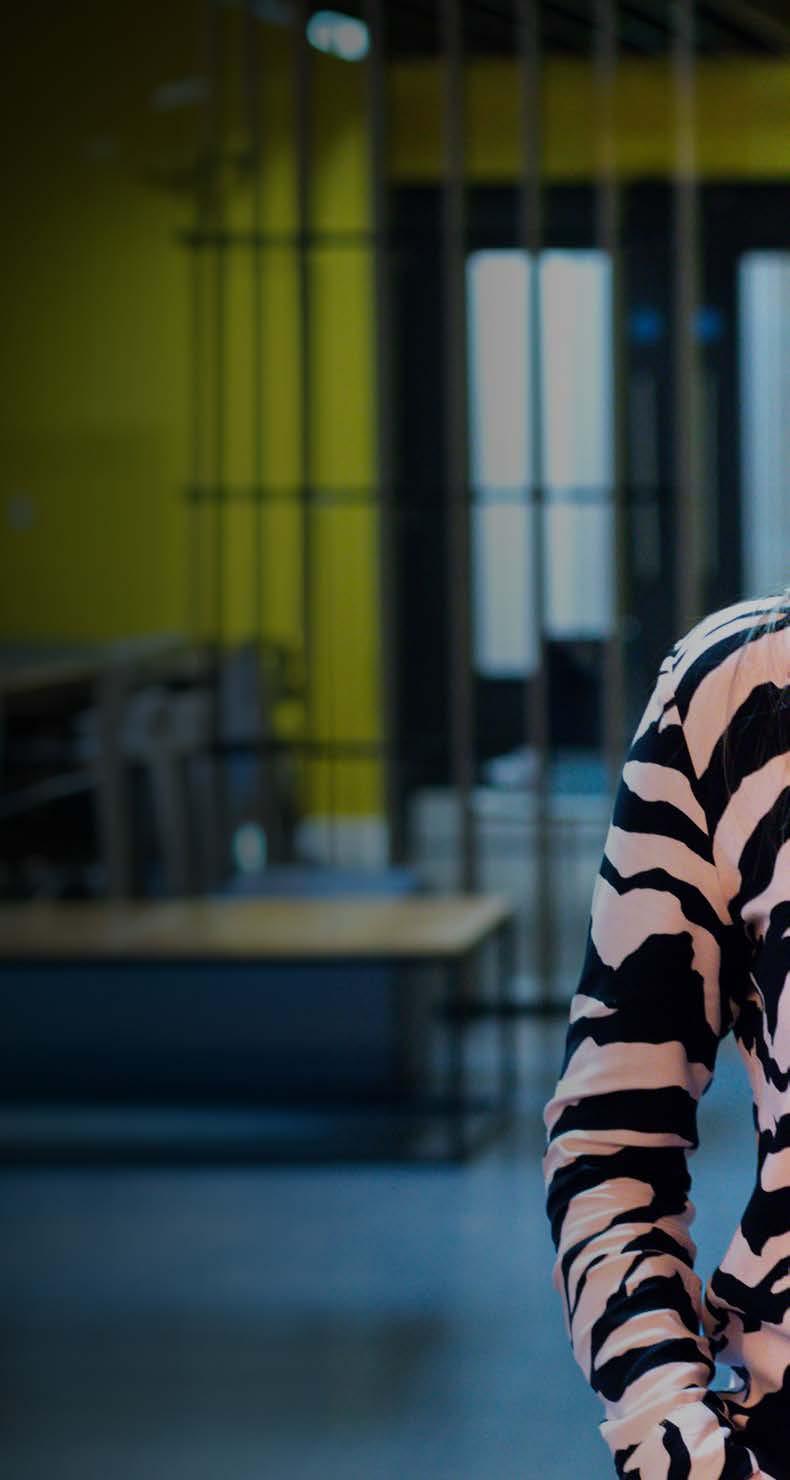
“PA is passionate about Catalyst’s Generation Innovation programme and supporting young people in Northern Ireland”
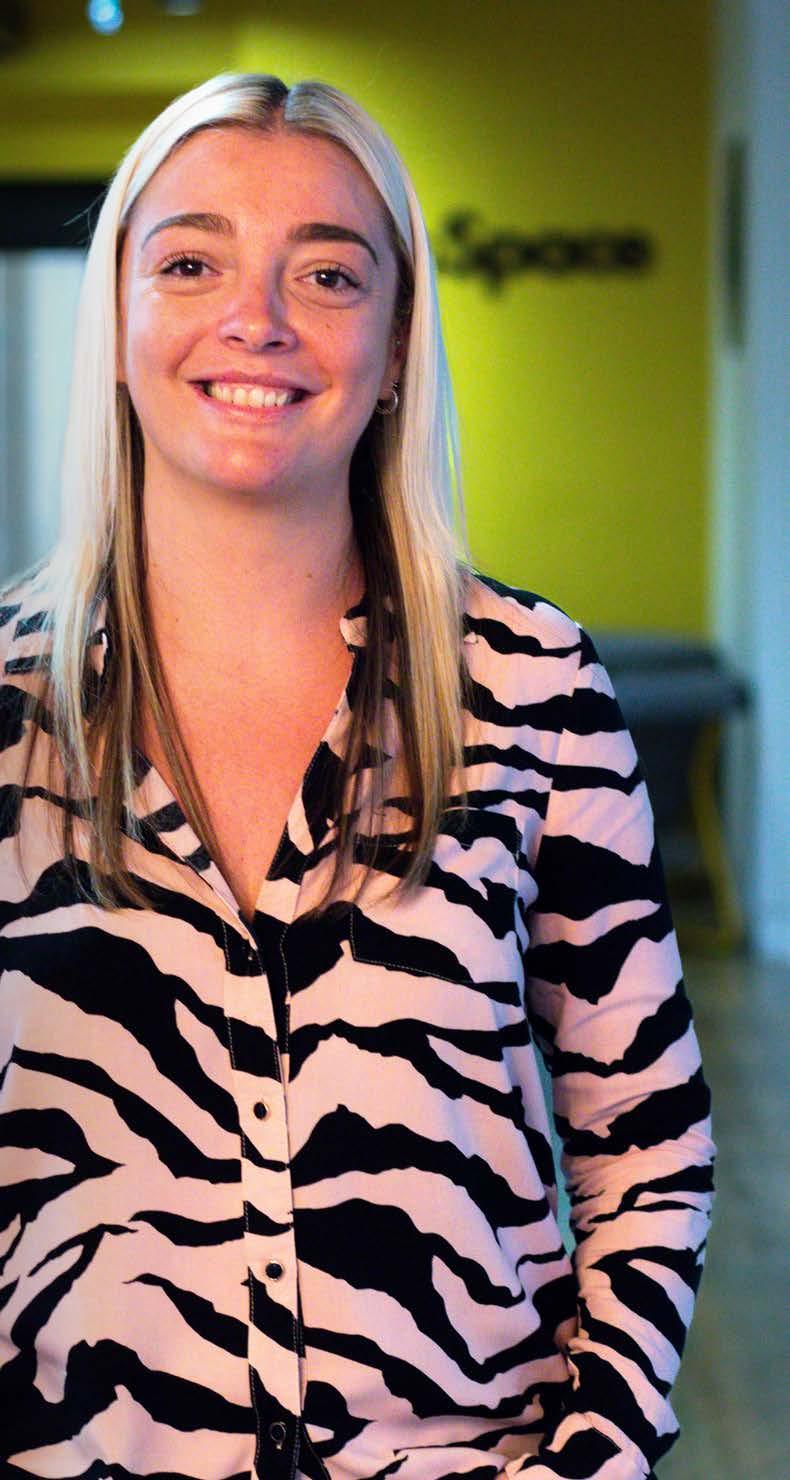
And Karen, who has been working in the Belfast office for six years this November, agrees the office is a particularly embracing and welcoming hub of activity: “I definitely think it is as well,” Karen agrees. “In our local market, I would like to think that PA is seen as that employer where there is lots of diversity, and people feel and can see that when they come into PA.”
Karen, who is one of the longest serving members of the team here in Belfast, explains she initially came to the company through PA’s Consulting Business Support function. Karen has remained within this function, however has been promoted within her role, most recently to the title of Senior Specialist.
“It is amazing to have your hard work recognised,” Karen explains, adding that essentially, “there are a few hats that I wear in my role.”
To begin with, Karen is the Belfast office manager, a role which sees Karen support three partners in London who sit within different capabilities, including offering general business support from financing, to diary management, and client management.
On the other side of Karen’s role, Karen is “very heavily involved” in Life@ PA, which is the firm’s strategy for all things Inclusion and Engagement. “I do a lot with PA in the Community, our volunteering and fundraising initiative, and I am also one of our Chairs for the global Pride Network,” Karen explains, adding that she helps look after PA’s objectives and things that they would like to do “across the globe for the community within PA” and also externally.
Karen’s role in Belfast had “really taken off” when she had started getting the office involved in the Belfast Pride Festival. “We were the first ever PA office to actually walk in a Pride Festival, so that is something I am really
proud of.”
“This really ignited my own passion for supporting people within the LGBTQ+ community, because I'm a part of that. I was heavily leaning into our global function to say, ‘what are we doing to help support people within the LGBTQ+ community and how can I get involved from a local aspect and also support the global initiative as well’.”
Karen did just that, and is now a valued source of support for anyone in PA taking part – not just practically but for emotional support as well. She says: “Anyone that is walking in a parade globally, I would help support and navigate through the finances, as well as help support with marketing, including getting the t-shirts ready.
“We also mark a lot of days, for example June is Pride month and there are a lot of different small events around each office to mark those days and generally just act as that ear of support for people, as well as helping with awards nominations. If anyone is facing or struggling with any sort of issues within the community and equally within PA, then I would be a point of contact for them to chat through and help out.
“It is very versatile, and you have to be ready just to jump off the hook. It was something I was really passionate about joining. I've never seen myself in a Chair role, but here I am this year. It has brought a lot of extra work, but it's work that I absolutely love and it doesn’t feel like work.”
Karen adds the move felt extremely holistic, explaining: “When you come into the company and really understand the way PA are, you know the saying of ‘bring your whole self to work’ really does ring true. Our staff in PA genuinely feel comfortable to be who they are and are able to express it.
“That's where I found my feet in this role, just by being keen and wanting to learn and grow more, and that has led
my role to grow into what it is now.” Karen, who worked with young people in her previous role, was keen to get involved from the offset when she joined PA after hearing about Catalyst’s Generation Innovation programme.
“I have worked with young people in my previous job, so I was always quite passionate about upskilling young people in different areas of personal development and professional development.
“So as soon as I started in PA, a colleague brought the Catalyst programme to my attention, explaining how innovative the programme is and how it brings work experience to a new light, and I knew I had to get involved as I recognised it as being something PA strongly aligns with.
“I got speaking with the Catalyst team, specifically the Generation Innovation programme team within the Catalyst group, and I believe it was only their second year when we came on board.
“We had to get involved because it is such a fantastic programme. Catalyst have basically reimagined work experience for young people across Northern Ireland. That is something that sticks out in my mind from my time in school,” Karen recalls. “There were no placements for what I wanted to do and so I was placed in retail stacking shelves. I got nothing from my work experience, because it is not what I wanted to do.”
Karen adds: “It is all about giving young people transferable skills, things that you actually need for the workplace but you can also broaden their horizons to what is actually available out there.”
With more traditional subjects generally promoted in schools across Northern Ireland, Karen is in agreement that the copious career opportunities in the world of tech need to be highlighted at school level. Programmes like Catalyst’s
Generation Innovation though, are real drivers for change.
“Our involvement with Catalyst has holistically grown over the years since we first got involved four years ago and being one of the company sponsors, we are extremely committed to it. Whenever you are in this programme with these amazing young people, you actually find something out about yourself too.”
This is the biggest year yet for the programme, which will see the team working across three locations in Northern Ireland this year: Belfast; Derry and Dungannon.
“The growth and support I have received from our leadership team means I have an amazing team of support who help fly the flag, and the project team who will be PA’s reps at the programme are just amazing!” This support also demonstrates that for PA, this is not just a ‘tick box’ exercise for them, they genuinely want to help mentor and support these young students.
Karen adds: “One of the really beautiful things about it, as well, is these young people are ready for the programme. They have volunteered for this and voiced they want to be part of it. Everyone who comes is really invested in it and they are ready to meet the challenge and to solve it head-on.
“And the ideas these young people have are mind-blowing. I think it is seeing things through a different perspective. As you get older, you sometimes put up barriers and think ‘Oh, no, we couldn't do that.’ Whereas these young people come in and are full of energy, ideas and enthusiasm, and it is so amazing to see.”
Karen explains that Catalyst also invite previous alumni who have taken part in the programme previously to return: “Catalyst don’t lose touch with these people. That's so important because it is
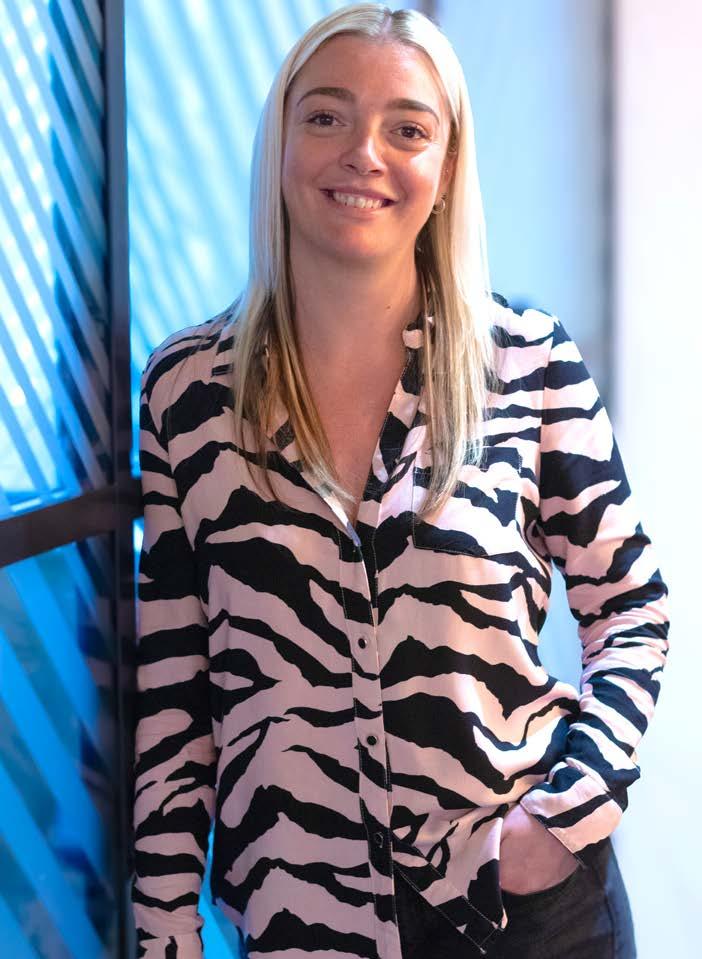
not just a week-long programme, they have so many opportunities there after, and these young people feel a deep sense of connection.”
When speaking of the importance of seeing more women in tech, Karen explains: “You can’t be what you can’t see, so this helps to take away that stereotype and showcases there is absolutely an exciting career for young women in tech.
“It also helps highlight the different pathways into tech, for example through apprenticeship programmes. There are so many options for young people now and careers certainly are no longer just straight lines.
“For example, I work in tech but I am not technical, however that isn’t to say I don’t get just as much out of this role as someone who is. It has also been really exciting and interesting to upskill myself and surprise myself by learning new things. When I started here it just felt like everything culturally aligned. Everyone was so friendly and I hit the ground running straight away. I haven’t looked back since.”
PA is passionate about Catalyst’s Generation Innovation programme and supporting young people in Northern Ireland. To this end, the team are running two different workshops across the Belfast programme this year, including running a ‘consultancy
conquest’ to show young people what it means to be a consultant in a fun and engaging way. This year, they are basing this around the World of Warcraft.
“Last year, we did a workshop around AI and that went down really well,” Karen explains. “These are the sorts of things we are trying to do to help support young people in that interactive, immersive, memorable way that really makes a lasting impression.”
Focused on fostering equal opportunities for all within innovation and education, Catalyst’s free work experience programme, Generation Innovation, for 17 to 18-yearolds across Northern Ireland first launched in 2018 and is funded by the Department of Economy.
The one-of-a-kind work experience programme is designed to empower, enable, and upskill young people for the workplace of tomorrow by pairing them with household business names such as PA Consulting and more.
Throughout the four to fiveday programme, participants collaboratively work to develop a solution for a real-world business problem, before pitching an innovative solution to the partner company and fellow participants at the end.
Catalyst are just one of the great organisations PA work with. This year, PA Consulting are also headline sponsors for the Stonewall NI Workplace conference, on 25 June in the MAC Belfast. This is the first event of its kind on the island of Ireland, and will be a fantastic opportunity for local businesses, people professionals, and LGBTQ+ networks to come together and learn how to best support their local LGBTQ+ communities. For more information and tickets, head over to stonewall.org.uk and check out their events section!
Jilin Mandumbal Raju, Jade Truffitt and Conor McCloy reveal what life is like in Cyber Security and why the technology sector in Northern presents such exciting career opportunities
Belfast-based company ESO, which has headquarters in Austin, Texas, as well as locations across the United States and Canada, is driven by the power of data to improve community health and safety, working with the likes of fire departments, hospital services and the government to help make a difference to people’s lives when they need it most.
Kathryn McKenna got the chance to sit down and chat with three members of ESO Belfast’s cyber security team recently - including the fact that since 2004, ESO has been pioneers in creating innovative, user-friendly software to meet the changing needs of the world today’s emergency service agencies, and they are the largest software and data provider to EMS agencies and fire departments.
During our chat, ESO’s flexible working culture truly shines through, with all three team members highlighting their remote hybrid working policy as a real catalyst for work life balance.
“Coming into the office one day a week with purpose because I want to, as opposed to all five days in my previous role at a different company, makes such a difference in terms of not having that commute twice a day,” Jilin reveals, to nods of agreement from his regional co-workers.
Jilin Mandumbal Raju, who is a Security Engineer based in Carryduff is joined by Jade Truffitt, a Security Risk Manager from Strabane, and Conor McCloy, who is a Senior Security Vulnerability Manager based in Coleraine.
Conor’s role is to oversee, and build out capabilities to identify, assess and manage vulnerabilities across the ESO estate. “This includes vulnerability scanning across all of our VMs and endpoints, including serverless infrastructure; as well as leading our



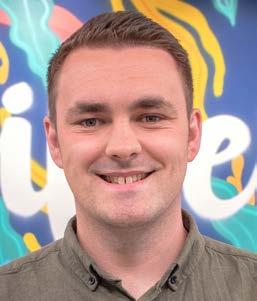 Conor McCloy Senior Security Vulnerability Manager
Conor McCloy Senior Security Vulnerability Manager

pen-testing and code scanning efforts at ESO,” Conor explains.
All three team members are passionate about ESO’s working culture, with each highlighting different reasons why they enjoy their roles.
“Just like Jilin, I really enjoy the hybrid working aspect, especially because I am based in Coleraine,” Conor explains. “I also really like the fact we can use the office with purpose when organising things like connection days with our in-person company meetings or town halls.
“The tech that we work with is a pretty unique proposition in Northern Ireland and it is very meaningful. With the company mission to improve community health and safety through the power of data, it means from a security lens, safeguarding the cyber security of our products makes it much more meaningful to me and relatable as healthcare is such a basic necessity and ESO does so much to support and drive improvements there.”
Conor adds: “I also really enjoy the quarterly security team events that we run. I think they're a great thing and I always really look forward to them. We'll organise an activity, for example going to Prison Island in Belfast and then we'll go out for a team dinner to help get to know our colleagues. It provides that recognition to the team for another good quarter’s work.”
And for new team member Jade, who joined the organisation in March, she reveals she loves the excitement of learning something new “every day.”
Jade’s role involves identifying and assessing risks within the organisation and working with the appropriate parties to remediate those risks. As part of Jade’s role she also manages the remediation to reduce service level and develop policies and procedures to promote a culture of security
awareness within the organisation.
Jade explains: “I worked with my previous company for a long time. Here, everything is new and it is quite a new programme so I'm able to put my own stamp on it. As Conor said, knowing what ESO’s mission is also makes it an incredible place to work as you know they are out there trying to drive the healthcare system and make it better and easier for the patients at the other end. Working in security, it feels good to know we are helping to protect patient’s information.”
Security Operational Engineer Jilin works closely alongside one other team member located in Belfast as well as the US team on the defence approach.
“Whenever we are getting our leads from security platforms, we are monitoring and investigating those sellers and if we need to make any forensic kind of activity, we will do it,” Jilin explains.
“The work life balance gained from working in a hybrid culture is invaluable. We are also gaining professional life growth from ESO. Whenever we are purchasing a new security product for example, we get training from the vendors. In addition to this, if somebody is interested in taking up other security courses, you can take part in the reimbursement programme. There is so much more, but the benefits overall are just amazing.”
Passionate about tech, Jilin has the following recommendations for young people wishing to pursue a career in the field, explaining: “There are a lot of foundational things you can do which are available for free in the current market which would be helpful for interviews and getting new roles. These courses are affordable courses and you will really benefit from receiving the real-time experience they are providing.”
Jade adds her own career path has
been “unconventional” after going straight into tech at age 18, where Jade worked with her previous employer for an impressive 15 years and got into security during a chance “rotational opportunity”.
“There was a business need for a short period of time to go in and help out and that was almost about eight years ago now.”
Impressively, Jade studied her third and fourth level education part-time during her mid to late 20’s whilst also working: “I was very fortunate that at the end of what was supposed to be a temporary position that they made my role permanent. So I got my first role in security and built on my knowledge while I was working in that area through external courses. I have just progressed from there.”
Meanwhile, Conor says his path into tech came about after recognising his passion in the area from a young age: “I’d always been really interested in tech and was into computers and gaming from a young age. That naturally led me to gravitate towards Computing and I.T throughout my education. From there, I studied computer science at Ulster University, Coleraine. I was the penultimate year of that course before it ended.”
Conor continues: “My interest in cyber security really peaked due to genuine curiosity and being on the cyber defence side helping protect against cyber attackers. I think the reason that probably came about was from being the ‘go-to’ person when I was younger to ensure that my family and grandparents stayed secure online as they entered the online world as well.”
Now that the trio are each in their respective roles, the resounding synopsis is that every day in the role is different. “We are lucky enough to be able to say that,” laughs Conor. “Every day truly is so different. Whether that's
working on a different product or one of the different tracks that we're responsible for.
“But normally a typical day for me, would firstly involve checking for any new tickets that might have come through in the night. Then I make sure all the vulnerability management platforms I'm responsible for are up and available. Then I'll monitor for any new zero day vulnerabilities and check whether they apply to our environment. I'll also evaluate whether any risk needs to be recalculated due to potential campaigns out in the wild where certain vulnerabilities might be being actively exploited in the healthcare industry or just generally.
“Each day will involve some level of project work as well. Finally, we ensure that we're continuously improving the defences on our side such as scanning methodologies in order to stay ahead of the curve of the attackers as well.”
Jilan says his day starts in a similar way, in that he also starts with tickets which generate from security platforms.
“If the tickets are normal tickets, for example if it's a false positive alert, then we can close those but if we suspect something is suspicious, then everything will change for the investigation. Apart from the incidents and others, we will be working on some enhancement for security projects so our team is fully busy with projects and more investigation and monitoring things. So we are using various products for monitoring platforms.”
Meanwhile, Jade says she is continuously learning new processes since joining the team at the beginning of March, as well as meeting new people; conducting vendor research; meeting with different business areas including procurement and different security teams; as well as working on possible collaborations in addition to streamlining processes across the
business. Jade is also writing the policy and procedures documents which are foundational for security programmes.
She also manages any risks already identified within the business and works with various teams to get those remediated.
In terms of the culture at ESO, Jade says she has been given a particularly warm welcome by the team and highlights the feeling of equity, diversity and inclusion, which is so paramount at ESO and rings through the company’s ethos.
“In my previous company I was heavily involved in their Women in Technology group and I co-chaired our LGBTQ+ Employee Resource Group, so for me the culture at ESO was a massive part of the appeal of joining the team and was actually one of the first things I asked about in the initial interview stage. Inclusion and diversity is definitely something I am really passionate about and I look forward to building those resource groups within ESO as well.”
Jilin, who has just celebrated his first year work anniversary at ESO, adds that the hybrid flexible working policy makes a crucial difference to having a work life balance: “Before I joined ESO, at my previous employers I worked five days per week in the office and I found travelling from Dundonald in heavy traffic quite hectic. So I was looking for a hybrid role. When I got the opportunity to work at ESO I feel I have really benefitted from the hybrid working culture. I had also heard great things from people in the industry about ESO’s multi-cultural ethos and culture days.”
Conor agrees that both the culture of diversity and inclusion as well as the hybrid working approach were definitely draws for him as well. “The hybrid approach works so well because when you're at home, you still feel that inclusion very much but then also
when you go in the office it feels very purposeful. With everyone being so approachable and having different ways of thinking, it makes you want to come in, so then when you're in the office it's helpful for problem solving.”
Conor, who has been with ESO for 18 months, adds the important point: “I think that culture extends itself to where, when we're doing things like employee value workshops and we complete surveys as part of that, everyone feels really empowered to have an input which helps to shape how we make any improvements. This helps keep that culture alive and going.”
And Conor, who always viewed the industry as an exciting place to work, urges anyone considering a career in tech to “go for it.”
He says: “There's a thriving technology industry here in Northern Ireland and it's only growing. Quite often, we hear that you can't actually fill the skills gaps out there and we're crying out for more people. There are definitely lots of opportunities within cyber security.
“Within the industry you'll have a rewarding career where every day is different and the one great thing is the mobility, so you don't have to need to have it all figured out on day one. You can start out as a software engineer or a tester and then you have that ability to pivot, to reskill and vice versa.”
Jade, who reveals whenever she was “really young” she wanted to be a policewoman, then later developed a passionate interest for CSI. “I wanted to be a crime scene investigator, but I hated science in school unfortunately, so it wasn't happening.”
But Jade explains she “eventually” got into cyber security, and although they are “all different things,” they are “all quite relevant to one another.”
To that end, Jade explains: “ I feel like I ended up in some respects doing similar
to what I wanted to do as a child.
“In terms of my advice to young people, I think a lot of younger people are put off by thinking you can only have a career in tech if you are extremely technically minded. But I would just like to emphasise that there are other roles out there. For example with my own career pathway, I have worked to my own strengths and interests, I wouldn't be as technical as Conor and Jilin, but there are loads of roles out there that you can get involved in.
“I would advise people to research those roles and see what is available and what suits your skill set. Some people really enjoy screen and code, whereas other people are more into the project management side or customer facing side. I think it's important to demystify roles within tech as a whole and just understand what is out there.”
Jilin, who completed his graduate and post graduate studies in India, says cyber security is a “booming sector across India”, adding “everywhere small private firms are giving training as well as live experience for certified ethical hacking.”
After gaining experience, including working at a French-based IT company, Jilin moved from India to the UK and got a role at a local company before moving across to ESO.
“There are a lot of opportunities available nowadays,” Jilin enthuses. “So many courses are available and they are often at affordable rates. When I was studying myself it was a lot more expensive, so I would definitely encourage anyone interested in a career in cyber security to go ahead with it as there are a lot of opportunities and more accessible programmes available now.”
Conor agrees, emphasising: “In terms of the pathways into a career in tech, you really don’t have to follow the
‘conventional’ route these days. There are so many apprenticeship schemes, programmes and tech courses as well. For example, I know from going to interview skills nights at my former school, most of the kids there are wanting to do the apprenticeship schemes with the local tech companies in Northern Ireland rather than the traditional ‘pure’ university route.
“There are so many different roles for people to get involved in and it doesn't have to just be school leavers as well. It is the perfect opportunity for those considering a career change into tech to pivot, jump in and start make a living straight away.”
How we like to switch off after a day in front of the screen
Jilin: “I spend a lot of time with my partner, going cycling and swimming, which is definitely how we enjoy unwinding together post-work. My partner is currently working abroad but when she is back we spend a lot of time together in the outdoors.”
Jade: “I like to spend as much time as I can at the sea, whether it is getting a walk to the beach or getting in for a dip. I love cold water dipping, it is brilliant. I only got into it a year ago but I have found it really blows the cobwebs off and you feel great after doing it!”
Conor: “Jade has put me to shame because I love getting into the water, though I haven’t been out this year yet! I also love walking the dog with my wife after work before settling in to watch whatever TV shows we are watching at the time. I'm also a big Manchester United fan and keen gamer, so anytime I get to watch the football or put on the PS5, I'll do that. We've also been getting into the gardening from the start of spring and find it is another good way to get outside and enjoy the fresh air.”
For more information on ESO and current roles visit eso.com/careers
In a continuing display of its commitment to Northern Ireland, EY has appointed its first Director of Social Value. As one of the first companies to appoint a dedicated role to social value, Kathryn
McKenna spoke with Jo McGinley at EY’s thriving Belfast office in Bedford House to find out more
EY is a global professional services firm with a 900+ strong NI office based right here in Belfast. The company is well known for its commitment to the communities in which they work, and social value plays a huge role in contributing to this. Whilst Jo’s role is specific to Northern Ireland, Jo is looking forward to working with colleagues across EY’s global offices.
“Social value has been an intrinsic part of the fabric at EY for a number of years,” Jo explains.
EY NI announced 1,000 new roles for the firm last September, this growth will see the organisation more than double its headcount over the next five years. With this in mind, Jo outlines how important a role social value will play.
“This new role will help amplify something we have been doing at EY for a number of years. We are one of the first out of the blocks to appoint a Director dedicated to social value which shows the commitment and importance it has to the growth of EY in Northern Ireland.
“Social value is not new, but it’s becoming increasingly critical for organisations to invest in by creating


dedicated resource and providing strategic direction. We might be one of the first, but we won’t be the last as I think that we will see more of these appointments across sectors in the region.”
One of the benefits EY offers their employees is the option to volunteer for a charity. All staff are allocated a certain amount of time which they can spend sharing their skills and time with their local communities and third sector.
Jo, who volunteers on a board of a local charity in Northern Ireland which supports young people with autism and learning disabilities and helps them to gain employment, says: “We currently have over 900 people who can dedicate two full days per year to the local community as part of their role at EY. As we double the amount of people we have working at EY Northern Ireland, this will naturally increase the level of vital social value work that is carried out.
“Many of us cherish working in an organisation that supports and encourages getting involved in community work and volunteering. Every employee wants to feel like they are contributing to their local community and be part of something ‘bigger’.”
As EY expands, it is an important time for a dedicated Director of Social Value to be appointed. “Building a strategy around social value for an organisation which is going to grow double-fold in the next five years is one of my key priorities,” Jo comments.
This strategy will be created in partnership with EY Northern Ireland’s existing community partners; which includes established relationships with the likes of Business in the Community NI, Catalyst, and STEM projects with
the Sisters IN programme; as well as expanding into the North West region.
“It is about building on our relationships across communities, partnerships and key stakeholders to have the greatest impact in the region,” Jo explains.
Jo will continue EY’s important work with schools based in Northern Ireland, with a particular focus on attracting more young females into the tech industry as well as those from a diverse background.
Jo comments: “The skills challenge in STEM in Northern Ireland is cited by many businesses as one of the key challenges to growth. Encouraging young people, and young females in particular, into studying STEM subjects is something which will be hugely beneficial for many of the key growth sectors in NI – like professional services and tech. We have been working alongside science and technology hub, Catalyst and sharing our global EY STEM app with 13- to 15-year-olds. This is a gamified app that opens the world of STEM in a fun and engaging way and gets young people to think about STEM in a different way.
“You become what you see, so working with schools is fundamental to encourage young people to consider STEM and a future in the tech industry. I think giving young female students and those from more diverse backgrounds a sense of belief can be truly life changing.”
EY NI has a number of existing partnerships with local schools and community focused youth initiatives including a ‘Time To Code’ programme roll out with EA and BITC, corporate sponsorship of Young Enterprise NI, sponsor of The Irish News Young Readers Programme, Catalyst Schools partner and more. This is in addition to a robust student recruitment programme which puts EY front and centre with NI schools, connecting local students and

young people to the opportunities EY can offer.
Diversity & Inclusion in our DNA Jo recognises the importance of diversity and inclusion to EY. She says: “Diversity and inclusion are part of the DNA of EY Northern Ireland, from our recruitment, our outreach, to working with schools, and also working in partnership with other organisations to reach those sometimes-unreachable pockets within Northern Ireland.
“We have 39 nationalities currently represented in our Belfast office – and this is growing every month. I believe this sets us apart because having that diversity of background gives us a better diversity of thought and approach. This all contributes to better teaming and ultimately, the services to our client are enhanced as a result.”
A great example of DE&I at EY in practice, is the Assured Skills Academy programme: EY NI have just kicked off their third academy, working with the Department for the Economy, focusing on Risk and Regulatory Compliance.
“The academy is a training programme for all, where no specific degrees related to professional services subjects are required. For example, a graduate of Architecture is welcome to apply and gain a route into EY. We encourage applications from all disciplines and will provide the necessary training to position applicants to apply for a role with us. The academy provides an opportunity to bring diverse skill sets to a professional services firm that perhaps would not have typically been
done in the past.”
Social value runs in the family
Having started off her career studying Law, Jo worked in the Middle East and London as a journalist before moving into public relations, communications, and finally professional services. When the role of Director of Social Value became available at EY, this seemed like the perfect combination of both Jo’s professional experience, and family inspiration.
“Social value has always been in my blood,” Jo explains. My late father also worked in Social Value, although it wasn’t called Social Value then. My dad worked in the oil and gas sector and repatriated nationals in Africa and in the Middle East into the industry. He managed training centres that supported people who didn't have the skills, experience, or opportunity into employment.
“My mum was a youth worker in the North West, working in some of the most socially deprived areas there. As well as professionally, there is a very personal element to this role – social value runs in my family.
“Working for an organisation which is committed to growing its presence in Northern Ireland really stood out to me, alongside EY’s focus on regionality.
“I am really passionate about making an impact here in Northern Ireland and I think with the growth ambitions that EY has, and the commitment I am seeing from leadership, that I have an opportunity to really make a difference.”
A new STEAM-focused workshop has been launched by Liberty IT and National Museums NI to inspire young people to develop their tech skills
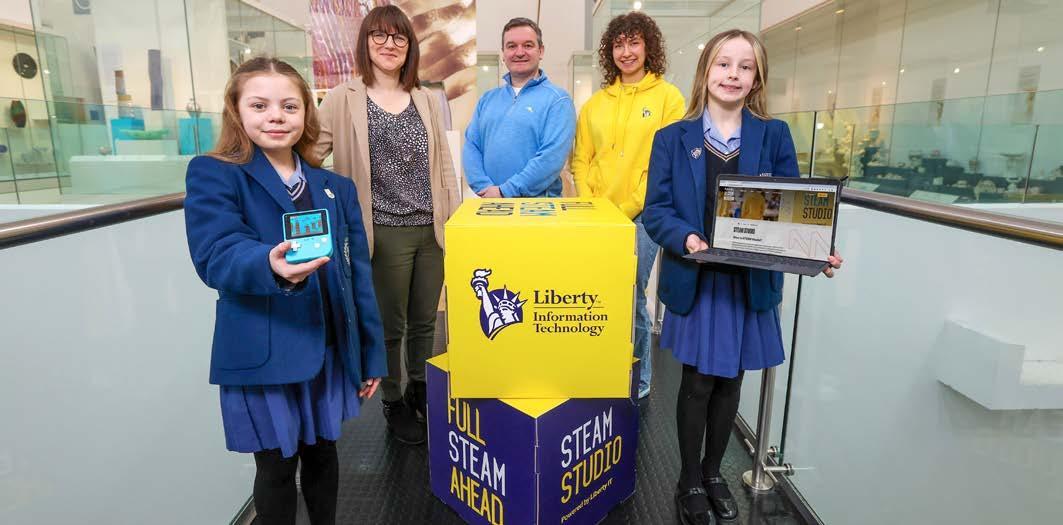
STEAM Studio powered by Liberty IT in partnership with National Museums NI, is a new, exciting collaborative workspace at the Ulster Museum, designed to connect coding and technology with the museum experience.
As part of the free programme, which includes complimentary return transport for schools availing of the workshop, students in Years 8 - 10 will be upskilled in coding that will enable them to design and create their own arcade game inspired by the museum’s applied art collection.
The 4-hour interactive workshop uses a school
and C2K approved coding platform which means students and teachers will be able to continue their learning and work in school after the visit.
Tony Marron, Managing Director of Liberty IT said: “We are absolutely delighted to unveil the STEAM Studio at the Ulster Museum which we have designed and developed in partnership with National Museums NI and the Nerve Centre.
“This is a programme that combines science, technology, engineering, arts and mathematics to encourage creativity, problem-solving and collaboration. It was important to us that we
created something that addressed the challenges of STEAM provision in education and the underrepresentation we’re still seeing across tech.
“As a business, we have some of the world’s best engineers and we are delighted that our teams will be part of this programme. Liberty IT employees will have the opportunity to impart their knowledge and experience, to educate and inspire Northern Ireland’s young tech talent of the future by volunteering to be a STEAM Studio ambassador.”
Louise Rice, Education Manager of National Museums NI said: “This is an exciting new workshop
to add to our education programme at the museum and for the first time we are fusing technology and art to create a really interactive experience.
“We carried out a pilot scheme and tested the workshop with 170 students from a range of schools and the feedback was excellent, so we look forward to welcoming lots more pupils to enjoy it. We are thrilled that the free workshop is now live and available for secondary schools across Northern Ireland to book.”
For further information, or to make a booking (allocated on a first come basis) go to www.ulstermuseum.org/ steam-studio
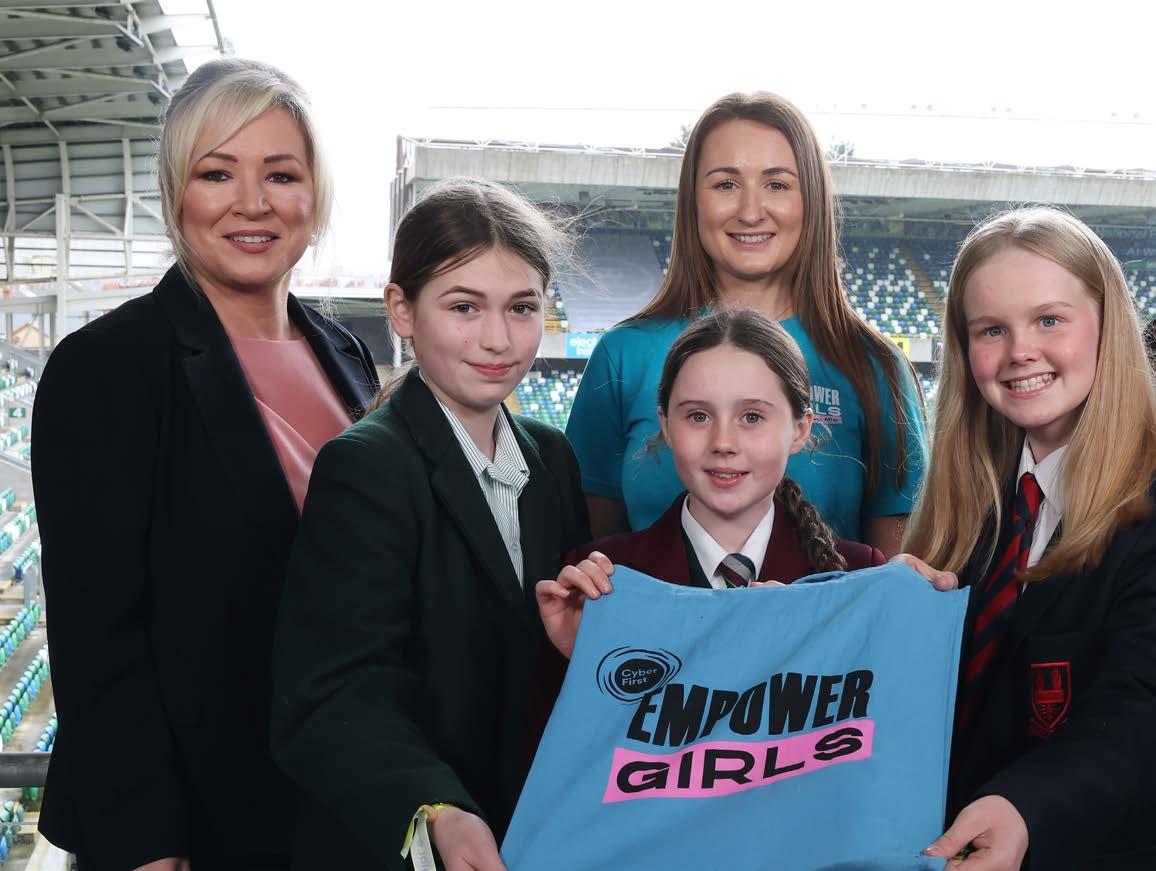
McKenna talks to Victoria Logan of Aflac NI and CyberFirst, who explains why it is so important to inspire and encourage more young girls into the thriving tech and cyber security industry in Northern Ireland
CyberFirst held its first EmPower Girls event recently, which saw 12 schools attend an immersive experience aimed at inspiring and encouraging a career pathway into the burgeoning world of technology and cyber security in Northern Ireland.
The event, which saw 250 Year Eight pupils attend the showstopping surroundings of the National Football Stadium at Windsor Park in partnership with Aflac NI for the day, saw leading representatives from 37 companies across the
province engage and interact with female pupils in a series of highly engaging breakout sessions.
The jam-packed cross-community schools event also heard from keynote speakers, such as cyber security expert Lisa Forte, in addition to panel sessions with questions from pupils themselves, as well as live cyber security demos and exciting competitions with fantastic prizes.
First Minister, Michelle O’Neill, and deputy First Minister, Emma Little Pengelly, attended the event in a reflection of
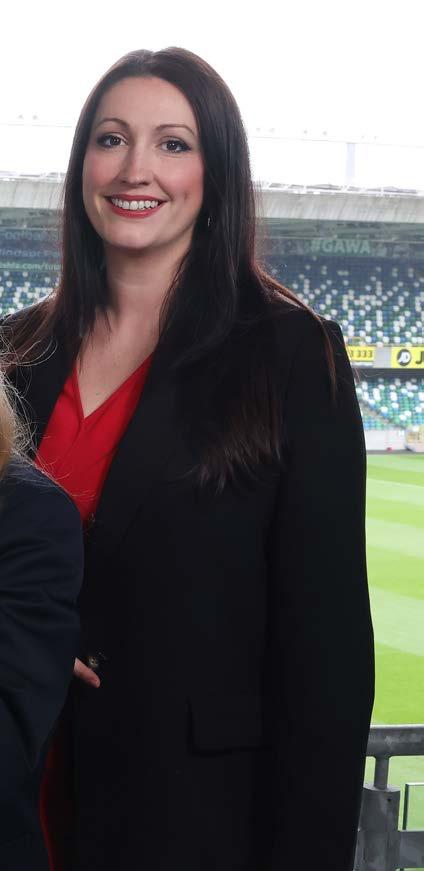
its significance, which was the first of its kind held specifically to encourage young female pupils into a career in tech and cyber security.
Victoria Logan, Cyber Security Communications Delivery Lead at Aflac NI who organised the event alongside Eamonn Brankin, Digital IT Hub Manager at Belfast Metropolitan College, and the rest of the innovative CyberFirst NI team, told Sync NI: “I think it underscores the importance of an event like this to receive such fantastic support in the form of attendance by the First and deputy First Ministers in our very first year.
“I think it went a long way to helping us in the future as well, and to see the buzz of the girls was just fantastic.
Whenever Michelle O’Neill and Emma Little Pengelly walked in there were a few gasps in the room and you could see how much the girls were engaged with them.
“Michelle and Emma are such important role models for females, both working in the most senior leadership roles in the country, so to have them come and be on stage to talk about the importance of tech and cyber security and the opportunities here will leave a truly lasting impression on the girls who attended.”
An impression was certainly made on the pupils, with around 30 per cent of the Year Eight pupils saying they would be interested in considering a career in technology at the beginning of the day. By the end of the session, when asked the same question this amount had been raised to 80 per cent.
“We were able to see from this rise that the event really did make a difference,” Victoria enthuses. “Even with the 30 per cent who were interested in a career in tech at the beginning, we would be hopeful that it would help encourage them even further towards it.
“For me, if you can make a difference for one person it is worthwhile, so to see 80 per cent of the pupils say they would consider a career in tech in the future, is such a positive to take away from the event.
“We wanted to very much get the pupils involved and engaged with all the different activities. People learn in different ways, so it is often about looking at the different ways people can engage with things and what interests them.
“Trying to provide a range of different things that are suitable for everybody was key. When I was going through school I always enjoyed doing more activity-based things rather than classroom-based, so I do think it is
important to show the pupils the different range.
“It was a fantastic day, I thoroughly enjoyed it and I got so much out of seeing the buzz about the place. There was a really brilliant atmosphere and you could see that the girls were really engaging with the different components of the day and it was a lot of fun.”
And Victoria reveals they specifically targeted the Year Eight age-group in order to start the conversation around tech at an early age: “We focused on the first year of secondary school as it is that grassroots level, they are completing their first year of secondary and it is so important to whet their appetite at this age,” Victoria says.
“Then in just a matter of months, when they are in Year Nine in September, they can take part in the CyberFirst Girls’ competition which is UK-wide. If they win, they get to go to a location somewhere in the UK and it will be a full day’s celebration. It is all about setting them up for their CyberFirst journey from now, the whole way through to when they graduate.”
Having identified the need for better understanding of the roles available within the technology sector, Victoria is keen as part of her role at CyberFirst to help educate pupils and schools about the exciting opportunities on offer.
“Part and parcel of why I am doing what I am now is because I can see all of the amazing opportunities here within tech and cyber. It is also about trying to dispel those myths that you are just going to be sitting at your screen coding all day; or that it is ‘just for the guys.’
“There is so much more out there; for example, I work within cyber security communications, education and awareness so I am more in the creative side of things. There are so many different career paths which can be mapped back to your interests and
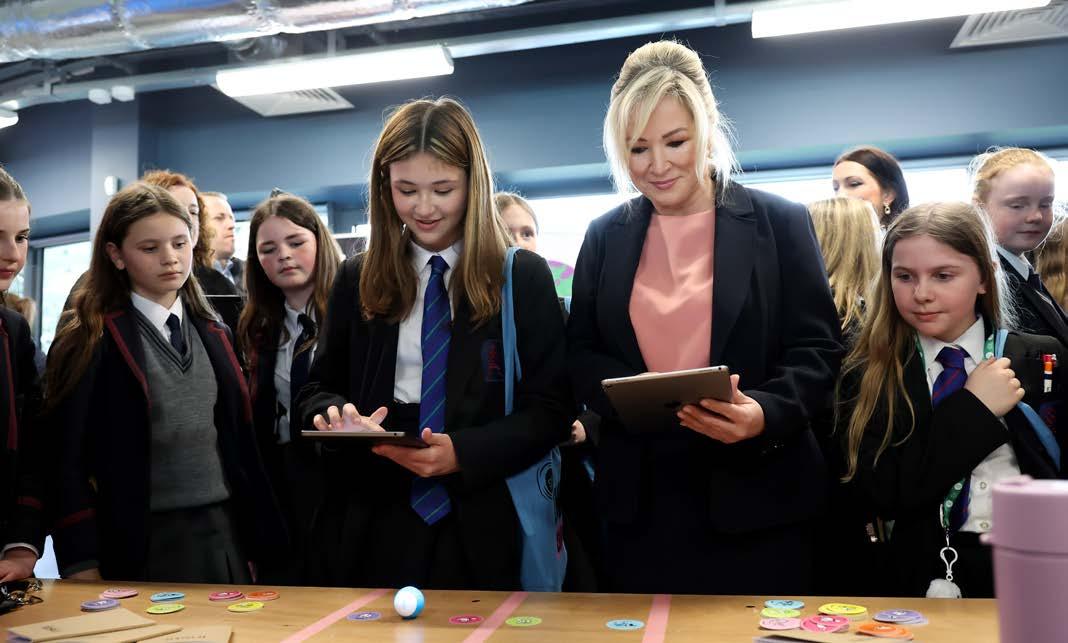
what you like doing at school, so I think it is really important at such a young age to let the girls understand that.
“It is also important to talk to them about some of the local companies that are here in Northern Ireland, right on their doorstep, from ASOS to Microsoft and so much more.”
Victoria adds: “Demonstrating all of the different opportunities to travel; the good pay; and the fact there is such a rich diversity of companies here is so important for these girls to realise. Yes, they are very young, but it helps to plant the seed and hopefully they will remember this day when they are making those important choices for GCSE and A-Level and it will open their horizons.
“It is very important especially considering Northern Ireland’s thriving tech and cyber security sector that all young people are at least aware of it.” Plans for next year are to expand the event based on the success of this year’s interest from schools and local companies:
“The reason this event is currently focused on girls is because just 23 per cent of the technology sector currently in Northern Ireland are female and we really want to try and help address this imbalance. However, CyberFirst is for all students and all age groups, so it is not to say the EmPower event will not be for a wider audience in the future. We try to accommodate everyone as far as possible.
“Next year, we would love to reach 1000 or more students in one day as well as open it up to more companies. We decided to limit our numbers to 250 this year as it was our first year running this event, but within the first five minutes of advertising with our CyberFirst schools we had requests for more than 600 places.
“CyberFirst is a really great platform to bring all the local companies together to perform schools outreach and it is easier for the companies as we coordinate the event for them so they can come along, get their brand out there, engage with students and make a difference.
“I think this CyberFirst event brings lots of benefits, because we are bringing together schools, all the industry, academia and government in one central place. I always say ‘we are better together.’”
‘A very inspirational day’ Local participating CyberFirst schools included: Bloomfield Collegiate; Thornhill College; Ballyclare High School; St Patrick’s College, Dungannon; Knockevin Special School; Ballymena Academy; Ballycastle High School; Our Lady’s Grammar School, Newry; St Ronan’s College; Wallace High School; Dromore High and Movilla High School.
A representative from Ballymena Academy commented: “From a school perspective - we’re trying to encourage girls to choose an IT related qualification as part of their GCSE and A Level study so giving them exposure to the opportunities as early as possible has been massively beneficial in achieving this. We’re hoping to see the number of girls studying ICT grow.
“The girls in Ballymena Academy
thought the event was very interesting and fun to find out about all the opportunities available to them both locally and globally around digital technology and cyber security.”
Pupils from Movilla High School also thoroughly enjoyed their time at the Cyber First EmPower Girls event, with pupils enthusing: "the day was very inspirational to young women."
At a glance: Speaker highlights Speaking at the event, First Minister Michelle O’Neill, passionately encouraged the young girls in attendance to ‘challenge themselves.’ She said: “Emma and I wanted to be here today to say well done for leading the way - because you are leading the way for other girls coming behind you. You are the first group of girls that have come together to learn all about cyber and this area of work and all the potential opportunities here.
“Believe in yourself. Be confident in yourself. I would ask you all to push your boundaries every day. Do something that makes you feel a wee bit nervous because you'll always learn from that. Sometimes, you'll succeed, sometimes you won't, but you'll always learn a lesson.
“We hope that you've had a fabulous day and you go away today, knowing something a bit more about this area of work and you tell others all about it, because women and girls deserve to be in this area of work also.”
Meanwhile, deputy First Leader, Emma Little Pengelly added: " There are all kinds of people who want to bring us down or tell us we can't do things. But Michelle and I are two girls, two women, who are at the top of the Northern Ireland government doing everything that we can to try to work to make the world – and Northern Ireland - the best place it can be for you.
“That's why it's absolutely fantastic
to be here today talking about all things tech, because we want to encourage more girls and more women to get involved in tech. I hope you really keep your interest in tech and that you seriously consider this as a career. Because if we're going to make Northern Ireland really shine in the world, we need to be at the forefront of the best workforce in the world doing the most exciting things in technology and the digital space.”
During opening comments host Catherine McCourt, Head of Engineering at Aflac NI, an American supplemental health care insurance company that established their Technology Centre of Excellence in Belfast nearly five years ago, spoke of her shock when she first recognised the lack of female representation in the tech industry here.
Speaking of the moment in her career, Catherine said: ““It took me years to figure out, but in the IT and cyber security industry, it is only 23 per cent female and 77 per cent male in Northern Ireland. You may find that hard to believe, but that's a fact.
“Having graduated from university and spent a few years in the industry, I really liked my job. It was interesting, it was challenging. I had a really good salary and good promotion opportunities.
“But I was mad - because other girls I knew were working just as hard as me in different jobs, for less money, for less promotion opportunities.
“And I was really mad that somehow all of the possibilities of the IT industry were being kept a secret from girls. No one was telling girls what it was really like to work in cyber and IT.
“Jobs in IT and cyber security are so varied and changing so fast and there's hardly a skill you could shout out to me, that would not be useful in the industry. When I think of working in IT I think about creative problem solving, working
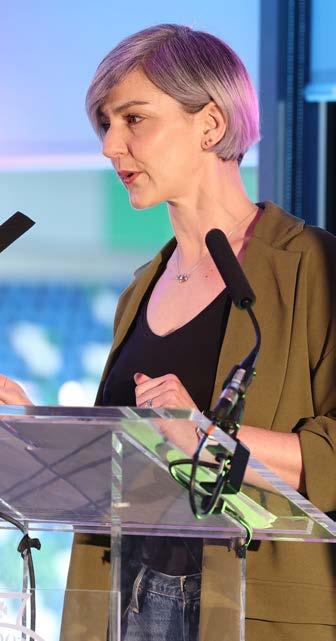
as a team to overcome obstacles together, and great communication to make sure the whole team works together in harmony. Not only that, but some of the most important developments in our society are being driven by the IT and cyber security industry.”
During her empowering keynote address Lisa Forte also urged the young girls in attendance to follow their goals. She emphasised: “Don't be afraid of thinking about having those big dreams and doing things and becoming whatever it is you want to become, because I was the shy kid at school who was a bit of a loner and didn't have lots of friends. Now I run my own company and I travel around the world.
“Whatever it is you want to do, whatever it is you want to be - just have the confidence to go after it and dream big.”
Students, Schools, Industry can learn more about the initiative and how to get involved here: https://www. nicybersecuritycentre.gov.uk/cyberfirst.
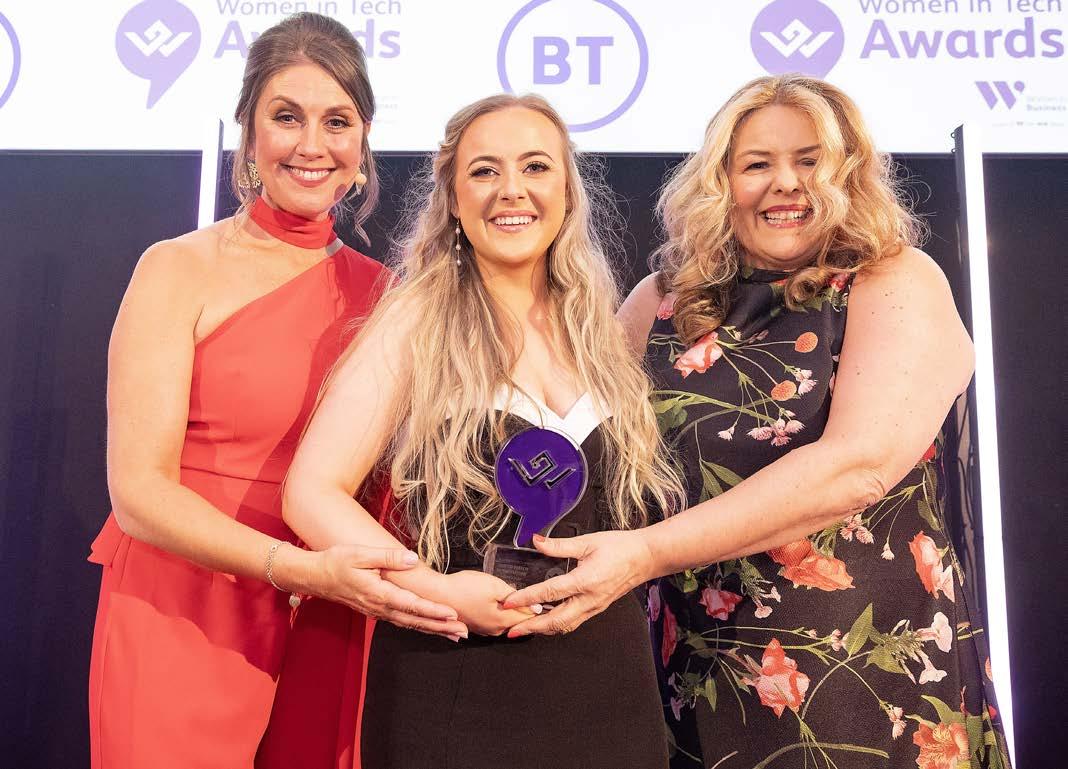
“Coding was a culture shock at first but I have fallen in love with it”
Hayley Rice, Robotics Developer at Danske Bank and recent winner of ‘One to Watch in the Future’ at this year’s vibrant Women in Tech awards, talks to Kathryn McKenna about her pride at being nominated for such an important award; how she got into a career in robotics; and how honoured she feels every day to be surrounded by such inspirational women in tech
“To be nominated in the first place for this award was enough for me,” enthuses Hayley, when asked how it felt to win ‘One to Watch in the Future.’
“I was chuffed because it's not only the recognition for my own work, but it's also recognition from the likes of Laurie Montgomery (Senior Transformation Manager) and senior management, who are so supportive. When I found out that
I had won, I felt really overwhelmed. I was not expecting it whatsoever, but I was absolutely delighted.”
Hayley truly believes in supporting other women and works hard to remove barriers and change perceptions. In keeping with this, Hayley has helped and supported many local programmes aimed at young girls in the community in particular, including: the Kainos Code Academy, internally with
the Women in Tech Affinity Network and the recent local CyberFirst EmPower Girls event. Young girls have previously cited more young female leaders in the tech industry as one reason why they may be inspired into pursuing a career in tech in the future, making Hayley’s work all the more important.
And speaking on the meaning behind the awards, which aims to celebrate women in Northern Ireland’s burgeoning tech sector, inspirational Hayley explains: “The Women in Tech awards are such a great platform for recognition of women in this industry where women are still underrepresented.
“It is so important to work with fantastic female role models who inspire me every day. Without that, I wouldn't be where I am today in my career. For example, in my first job straight after university, I was the only female in the office at one time. So coming to Danske Bank and having so many amazing female role models to surround myself with has really propelled me and given me the confidence to keep pushing on.”
Having studied at Queen’s University, Belfast, at one stage Hayley briefly considered moving to Liverpool for university, before deciding to study and pursue a career in Northern Ireland: “I decided that Belfast is such a tech hub and it would be a mistake to leave,” Hayley explains.
After graduating from university in 2020, “a hard time to graduate” due to the pandemic, Hayley started off her career working in a small consultancy firm in Belfast with headquarters in London.
Hayley worked here for a year before making the move to Danske Bank’s Technology & Digital Development team: “I have just been over the moon and really happy here,” she reveals, before outlining: “Part of my daily role involves taking administrative, repetitive tasks away from rest of the workforce and letting them use their time and energy for more productive things where they can add more business value. We automate them so they can use their time elsewhere.”
And whilst Hayley is thriving in her role as a robotics developer now, her career pathway was unique in that she initially studied both business and computing: “I wasn’t sure at one stage if I wanted to pursue business or computing,” says Hayley. “I originally did my placement in accountancy and soon realised I missed coding too much, so I was very happy in my final year of university to get back to coding. A career in robotics then came about very organically.
“My first graduate role was in robotics and it's quite a low-code environment. So, although I did have that coding experience from university, robotics is quite robust. You don't have to
have code experience to get into it. I also thought robotics was a great way to branch the gap between business and computing to see what I liked. Coding was a culture shock at first but then I absolutely fell in love with it, and have been enjoying it ever since.”
Hayley adds for young people interested in tech, there are many local groups which can help you learn new things as well as build up your own community:
“Girls Who Code and Women Who Code and these types of groups are fantastic because they give you a platform to learn new things that aren't necessarily on your curriculum.
“They are also a great way of forging new friendships. The courses usually last five to six weeks and your final project is usually a group project. They are a fantastic way of meeting new like-minded people in the flourishing tech industry here in Northern Ireland.”
As a young woman in tech herself, Hayley has the following words of encouragement for a young girl who might be considering a career in the industry but might be feeling disheartened by the current statistics of just 23 per cent of females working in the tech industry in Northern Ireland.
“If you're interested in it, just go for it. Don't be afraid to try new things. For instance, I did my work experience in
an accountancy firm but I realised I didn't enjoy it and instead, I had a passion for coding.
“It is so important to advocate for yourself. Don’t feel like there is ever anything holding you back. Women can very much suffer from that feeling of imposter syndrome, I definitely do. But don’t be afraid to ask for things that you feel you deserve. Mentoring is so important as well, as is surrounding yourself with inspiring female role models.”
Specifically, Hayley praises her close-knit team: “My manager Laurie has been a huge source of inspiration for me, she is such a supportive manager and to have another female supporting you is fantastic. Our Solutions Architect, Jacqueline Swann, is also amazing and has provided so much support for me.”
Hayley also points to Vicky Davies as an inspiring female leader. Vicky joined the Board of Danske Bank UK in 2016 and was appointed Deputy CEO in 2019. In September 2021 she became the first female chief executive in the bank’s 200-year history and one of the few women to hold such a senior role across Northern Ireland’s banking sector.
“Our CEO, Vicky Davis is a massive source of inspiration. She’s also a mum to four boys and she's just absolutely smashing it. She is a very inspirational woman.”
Fernanda Valeiro Soares is the award-winning ESG Cultural Delivery Manager at Version 1, having been recently awarded the prestigious Advancing Diversity Award at the recent annual Women in Business event
“Winning the award for Advancing Diversity at the Women in Business awards this year was an incredibly gratifying experience,” Fernanda, who is based at Version 1’s Belfast office tells Sync NI.
“This award encourages me even further to continue my efforts in championing diversity within the tech industry.”
As ESG Cultural Delivery Manager, Fernanda plays a pivotal role in spearheading events which promote environmental sustainability and social responsibility across the prominent IT company, which offers a range of services including Cloud, ERP and digital solutions for global brands.
Version 1 in Northern Ireland is on an upwards growth trajectory as they are currently hiring for multiple roles based out of their Waterfront Hall adjacent, prime city centre location which overlooks the River Lagan and is just a short walk away from Lanyon Place Station. Outgoing and dynamic Fernanda is a passionate advocate of the diverse and inclusive workplace, explaining to Sync NI how welcoming the team have been since she joined Version 1 five years ago.
It comes as hard-working and determined Fernanda moved to Ireland on her own from the centre of Brazil eight years ago. Having worked in marketing in Brazil since 2007, at first Fernanda worked in other areas as she
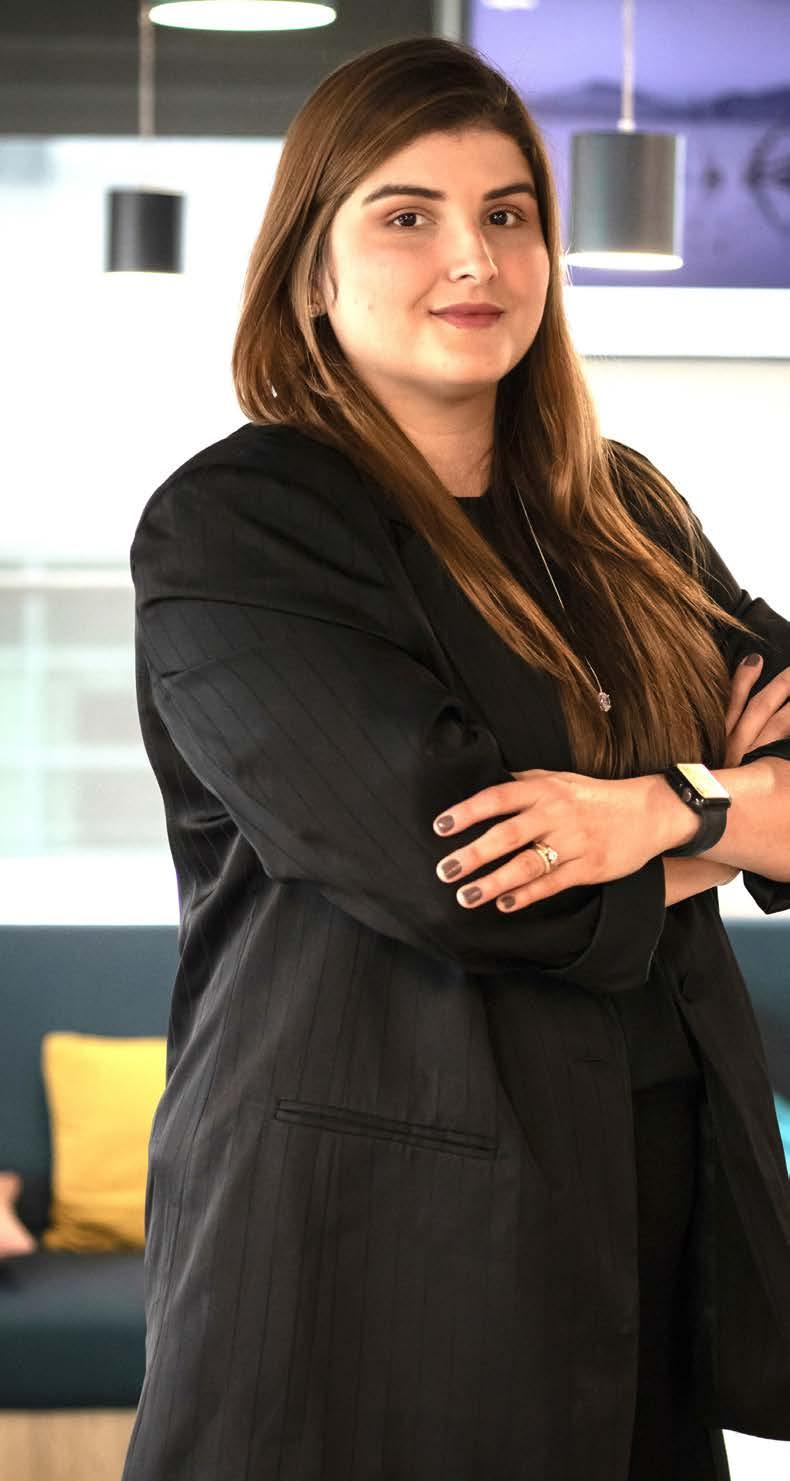

learnt English from scratch on the go.
“I was just trying to survive in terms of learning the language when I first came here,” Fernanda explains.
“I worked as a cleaner and a nanny, until I felt more comfortable getting back to my professional area. I had great experiences and met so many lovely people.
“I have nothing to complain about the people of this country, everyone has been so lovely to me from the very beginning since I moved here.”
When Fernanda, who incredibly met her now-husband during this time who also hails from Brazil, heard through friends of the empowering company culture and ethos at Version 1, she felt compelled to apply.
“I would never have met my husband had we not both moved here as we are from opposite sides of Brazil,” explains Fernanda, who by this stage had built a close network of friends.
“I had heard about the Core Values and Profit Share scheme of Version 1 from one of my friends who happened to be a Version 1 employee,” she adds.
“And when I came across a job opening matching my skill set, I knew I had to give it a go.”
“Version 1 fosters a culture that values collaboration, respect and inclusivity. It promotes a sense of belonging among employees regardless of their backgrounds, identities, or perspectives,” Fernanda, who celebrates her five-year work anniversary at Version 1 last month, enthuses.
“Version 1 also emphasises employee engagement through regular communication, feedback mechanisms, team-building activities and recognition programmes that acknowledge and
appreciate employee contributions. “This creates such a positive work culture, promotes employee engagement and satisfaction and attracts and retains top talent, making it a great place to work.”
Fernanda is passionate about mentorship and encouraging more women and young girls to pursue a career in tech, and credits her own mentor Lorna McAdoo, ESG Group Director and Version 1 NI Lead, as being an invaluable source of support, guidance and inspiration throughout her Version 1 career.
“If it was not for Lorna, I do not think I would be where I am today,” Fernanda explains.
“Not because I am not hardworking, but because when I joined Version 1 five years ago my lack of confidence was horrible.
“Lorna saw this and helped me a lot, for example Lorna would bring me to meetings with her to encourage me to learn more about the tech industry and help me with networking.
“I know a lot of people from Version 1 across all of the different offices and that is thanks to Lorna, this has really helped to meet lot of people and learn more about the tech industry.”
Speaking on the importance of mentorship and guidance, Fernanda explains it is part of the inclusive ethos at Version 1, which welcomes diversity and encourages volunteering at the ESG events which Fernanda coordinates across all of the different offices from Belfast, Australia, Dublin, London, India, Edinburgh and more.
“In terms of engagement, at Version 1 we organise wide-ranging initiatives around the pillars of developing diversity and inclusion, health and wellbeing, education, employability,
environment, and sustainability.
“One candidate might have a special interest in women in tech, and so they can come on board and help to promote women in tech within the community.
“Also, internally we have a focus on trying to bring more women into the company. We try to offer support to women who get a new position at Version 1 by offering a buddy system for at least the first six months.
“I have had buddies before and it is great to be able to help them with whatever they need, for example if they had had some training and they are maybe feeling a little bit lost or even just something minor, like needing help with a timesheet.
“It is all small things, but it is just so important to have someone there that they can reach out to. I would check in with my buddy to check that she was okay at least every 15 days and we just grab a coffee and have a friendly chat.”
With Version 1 actively encouraging more women and young girls into pursuing a career in tech, these mentorship and work experience opportunities help to address the gender imbalance in the industry, which has improved in recent years but still has room for improvement at just 23 per cent of females currently working in the industry in Northern Ireland.
“I wish I had the opportunity to participate in work experience in Brazil, the work experience opportunities that companies offer students here in Northern Ireland are fantastic” Fernanda explains
“At Version 1 we have work experience, and we have a pillar called education and employability where we invite schools to come to the office and organise two or three days of employee talks, employability skills, Inspiring the next generation into technology,
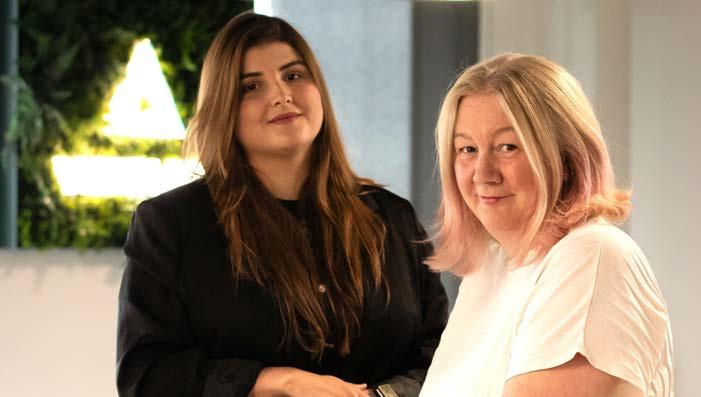
raising awareness of the roles available in technology and break stereotypes traditionally held of careers in technology.
“I noticed that every time that we were organising some work experience that there were more boys than girls and those girls might feel slightly uncomfortable because there were more boys in the room.
“I proposed to Lorna and the Women in Tech Global Lead, Honey Bell, that we could organise a work experience which is only for girls. The idea is not to separate the boys and the girls of course, but it is just to make the girls feel a little bit more comfortable.
“We would then just invite employees that are women to inspire even more of those girls. It has worked really well, and we have been doing it for two or three years ago now with local schools. It is so rewarding to see the pupils really enjoying it and actively engaging with women who are working in the tech industry.
“For example, I would invite women like Ciara Havlin who is a software developer and she would talk about how she started her career, why she decided to pursue a career in tech, and at the end of those two days it is incredible to see how excited the girls are at the idea of a career in the IT industry.”
Learning new skills at the Digital Academy
“Another thing I try to tie in with this for the girls is a programme called the Digital Academy Skills, where we try to encourage the associates who have joined Version 1 through the Digital Academy programme to come to the work experience with the girls because then they can share their career journey as well.
“This is because most of the people that are in the Digital Academy programme do not come from a tech background and so it is very interesting for people considering changing or starting a new career in tech.
“For example, we have an associate and at university, she studied History. It is unrelated to tech but through the Digital Academy, she was trained and now she is in the tech industry and doing so well in her career.’’
“This is why I always try to encourage the associates to come in and actually talk with the students to encourage them, so it is another way of appealing to those also who might like to try something else or new by offering them new opportunities.
“We are also giving those associates who are getting involved the opportunity to ‘level up’ in areas including presentation, creating programs for the students, and more.
Overcoming imposter syndrome
“I may not ever feel as confident here as I was in Brazil with my position as a Brazilian woman,” Fernanda explains.
“For example, in Brazil if I was running an event and speaking in front of a lot of people, I would have no problem. But here, because English is not my first language, of course it gives me a little bit of fear.
"I embraced my fear but didn’t allow it to control my actions. One instance was when, two years ago, I joined a panel at a Women in Tech event in London."
“My advice to anyone not feeling confident is to be persistent and challenge yourself.
‘’I really enjoy sharing my story with young students and trying to inspire them.
“I like telling them about how I moved to this country eight years ago without speaking a word of English or knowing anyone here. It is all about encouraging them to believe in themselves.
“Career growth can be difficult and scary — step out of your comfort zone and embracing new opportunities can trigger a whirlwind of self-doubt.
“Remember, you're not alone! Reach out to a trusted peer or manager for support, guidance, or validation to boost your confidence. Identify someone you admire within the field and create opportunities to absorb their knowledge.
“If you trust the person, share your feelings of impostor syndrome with them. When I opened up to my mentor about my feelings, they expressed surprise, which greatly boosted my confidence.
“Accept fear but do not let it take the driver’s seat. And always remind yourself that sometimes you are your
own toughest critic.’’
Fernanda’s respect for mentor Lorna, who received the award of Outstanding Management and Leadership at the recent Women in Business awards, is evident throughout our interview, and Fernanda credits Lorna with always being by her side to support her when she has feelings of self-doubt.
“Due to how fantastic Lorna has been at putting me by her side, I have created all these connections throughout the years, and I have definitely regained some of my confidence.
“I always see Lorna helping and supporting all the women she can, and it really inspires me to do the same for others.”
“Lorna has won a lot of awards, and she truly deserves them as she really is that person who always tries to make sure other people get their spotlight. That is an incredibly beautiful thing.”
Words of advice
When asked what advice Fernanda would give to someone in her position eight years ago or considering a career change and interested in developing a career in technology, Fernanda encourages learning new skills and researching companies which prioritise diversity and inclusion.
Fernanda said: “Embrace continuous learning. Invest in acquiring new skills, whether its formal education or online courses. The tech industry is constantly evolving, so staying adaptable and up-to-date with the latest trends and technologies is crucial.
“I think you can also try to build up a strong network within the tech community and seek mentorship from experienced professionals, as networking can open doors to opportunities.
“I would really suggest looking for
companies that prioritise diversity and inclusion.
“These environments tend to foster creativity, collaboration and innovation and they offer opportunities for individuals from diverse backgrounds to thrive and make meaningful contributions.
“Most importantly, be resilient, persistent and believe in yourself and your abilities. With determination, hard work and a positive mindset, you can overcome challenges and achieve your goals.”
Celebrating an important milestone
“One of the main policies at Version 1 is ‘no ego,’” Fernanda tells us. “For example, Lorna is a director, but people do not feel like they cannot approach Lorna to talk to her because she is a director. Lorna is so easy to approach.
Fernanda marked her five-year work anniversary with Version 1 on 15 April and reveals she is looking forward to marking the special career milestone.
“It is an amazing accomplishment, so I hope to do something really nice to celebrate,” Fernanda enthuses.
“I remember in the first month thinking that I may not be able to cope because everything was very different and of course I was scared of the new experience, but I was open to learning and getting as much as I could from this amazing opportunity to learn and I accepted the challenge.
“It is nice when I look back and think about my whole journey so far, and how much I have grown and how much I have learnt.
“It is also amazing to remember the different ways I have supported others to do the same which has been really special to be able to do as I have learned and grown in the company. I am really happy and proud of myself as well.”
“Clearly communicating CME’s company's mission and values helps employees understand their impact”
CME Group's Andrew Connolly tells Sync NI why there is “no place
like home” and identifies what Belfast stands out for in particular

q What are the key attractions of Northern Ireland and Belfast in particular as a location for establishing a business?
Northern Ireland, particularly Belfast, offers a strategic location for companies with a global footprint, facilitating a follow-the-sun operational model by bridging the gap between counterparts in Asia and the U.S. markets.
Moreover, the region has a strong talent pipeline, bolstered by local universities actively engaging with industry, as well as tailoring courses to meet evolving needs of local businesses.
q How does Northern Ireland compare to other countries you currently have offices in, and does Belfast stand out for anything in particular?
I would of course say there is no place like home! I do see lots of similarities across the various offices I have been fortunate enough to visit, and the one thing I would highlight is the people.
Whether it's in Chicago or Singapore, people are welcoming and keen to help. If you really pushed me, I would say Belfast is renowned for being able to identify areas of friction and work these through to resolution in a collaborative manner.
q When working across multiple locations, with different time zones, how do you build team morale and that all-important company ethos?
When managing teams spread across different time zones, nurturing team morale and fostering a common company culture becomes paramount. To achieve this, I prioritise video calls over voice calls to promote face to face interaction,
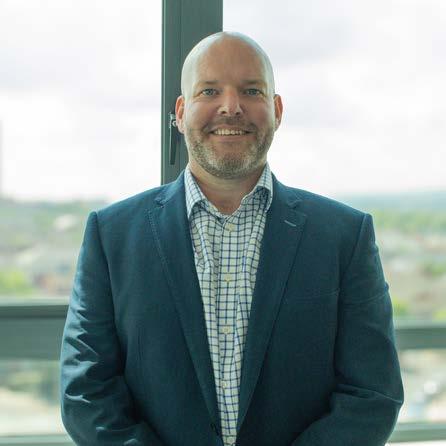
enhance communication and build connection despite the geographic distances.
Implementing global mentorship programmes encourages knowledge sharing and cross-cultural understanding among employees from various locations, too. Facilitating occasional travel opportunities between offices strengthens relationships and promotes in-person collaboration.
Finally, supporting employee resource groups focused on activities such as global cookery classes and yoga sessions fosters camaraderie and well-being across the company, thereby reinforcing the ethos of collaboration and inclusivity across borders.
q As a business, what strategies are crucial in attracting and retaining top level talent?
To attract and retain top-level talent, one thing businesses should consider creating is an inclusive culture that supports diversity. Employee resource groups (ERGs) are an excellent way to do this and to ensure everyone feels valued.
Offering competitive compensation and comprehensive benefits is also crucial, along with providing continuous training, clear career paths, and flexible work arrangements to promote a work-life balance. Finally, encouraging innovation and recognising creative contribution fosters a dynamic work environment. Leveraging the latest technology and continuously improving the tech stack also enhances productivity and the attraction to an employer.
Clearly communicating the company's mission and values
helps employees understand their impact. You can also build a strong employer brand through positive workplace practices and social media presence, alongside offering mentorship and leadership development programs, further solidifying a company’s appeal to top talent.
q How do you ensure diversity and inclusion in the workplace as well as embracing different cultures?
At the CME Group, we recognise that diversity and inclusion are fundamental to building a cohesive and inclusive culture. To ensure these values are deeply embedded in our workplace, we have established a comprehensive approach. For example, we have 11 ERGs that connect colleagues with shared backgrounds and interests, fostering a global network of support and collaboration.
These groups play a pivotal role in promoting cultural awareness and providing a platform for underrepresented voices. We celebrate various cultural events and heritage months, encouraging employees to share their traditions and experiences. This practice not only educates but also fosters a respect and appreciation for different cultures.
We are also committed to recruiting a diverse workforce by partnering with diverse job boards, attending career fairs aimed at underrepresented groups, and continuing to follow unbiased hiring processes. Our policies are designed to promote inclusivity, and we provide regular training on diversity and equality.
q Have there been any specific examples of positive experiences from establishing a business in Belfast that you have been able to implement in other locations?
Establishing a business in Belfast has yielded valuable experiences that have been effectively replicated in other locations by CME Group.
For example, Belfast’s collaboration with our Bangalore office has enabled the implementation of the ‘follow the sun’ model, ensuring seamless global support and service delivery.
Additionally, the maturity and capabilities demonstrated by our Belfast team have led to the global ownership of services rather than only regional oversight. The collaborative culture and successful talent development strategies in Belfast have served as models for other offices, fostering innovation and attraction of more top talent.
Moreover, our positive engagement with the local community in Belfast has inspired similar efforts globally, enhancing our corporate social responsibility profile.
q What support did you receive as a company setting up in Northern Ireland? How vital was this for you as a company?
As a company setting up in NI, we initially received support from InvestNI, which was instrumental in facilitating our entry into the region.
The most significant and enduring support came from the community and collaborative ecosystem within Belfast, particularly across the FinTech sector.
Regular roundtable sessions and engagement with like-minded companies have proven invaluable over the years. This collaborative environment has enabled us to address common challenges, share best practices, and foster innovation collectively. Whether collaborating on proposed university courses to address specific gaps or working together on Environmental, Social and governance (ESG) initiatives, the network has been indispensable in our journey.
This support has been vital for our company’s growth and success in Northern Ireland, underscoring the importance of a strong ecosystem and
collaborative partnership in fostering business development and innovation.
q Would you like to see any further initiatives or programs that would help to further support FDI businesses who have established an office in Northern Ireland?
Absolutely, further initiatives and programs to support Foreign Direct Investment (FDI) business in Northern Ireland would be highly beneficial. One such initiative could be aimed at enticing Northern Ireland expats to return home, bringing with them valuable skills and knowledge acquired abroad.
This initiative could offer incentives and support packages to encourage expats to return and contribute to the local economy. Additionally, funded exchange programs for local talent to gain international experience could be implemented. These programs could provide opportunities for employees to work or study abroad, fostering a global mindset and bringing new insights and perspectives back to Northern Ireland.
q Are there any other initiatives or programmes you would like to see for FDI companies established in Northern Ireland?
Any programmes aimed at increasing skills among local staff members would be valuable. This could involve partnerships with local educational institutions or training programs to offer specialised courses or certifications relevant to the company's industry. By investing in the skills development of local talent, FDI companies not only enhance the capabilities of their workforce but also contribute to the overall growth and competitiveness of the local skills pool.
Additionally, offering opportunities for career advancement and skill-building can improve employee retention and satisfaction rates, ultimately benefiting both the company and the community - a win-win scenario for FDI companies and Northern Ireland alike.
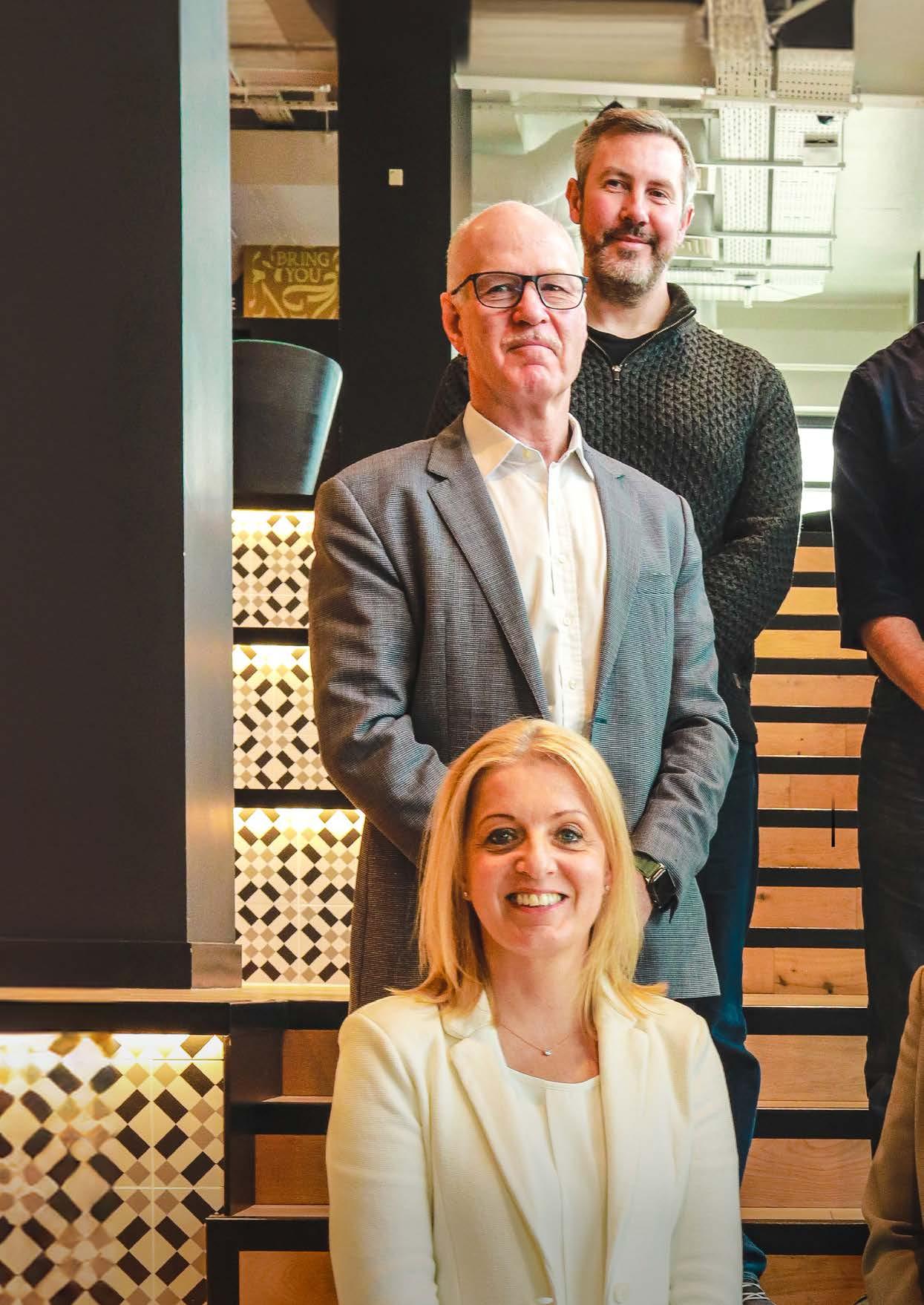
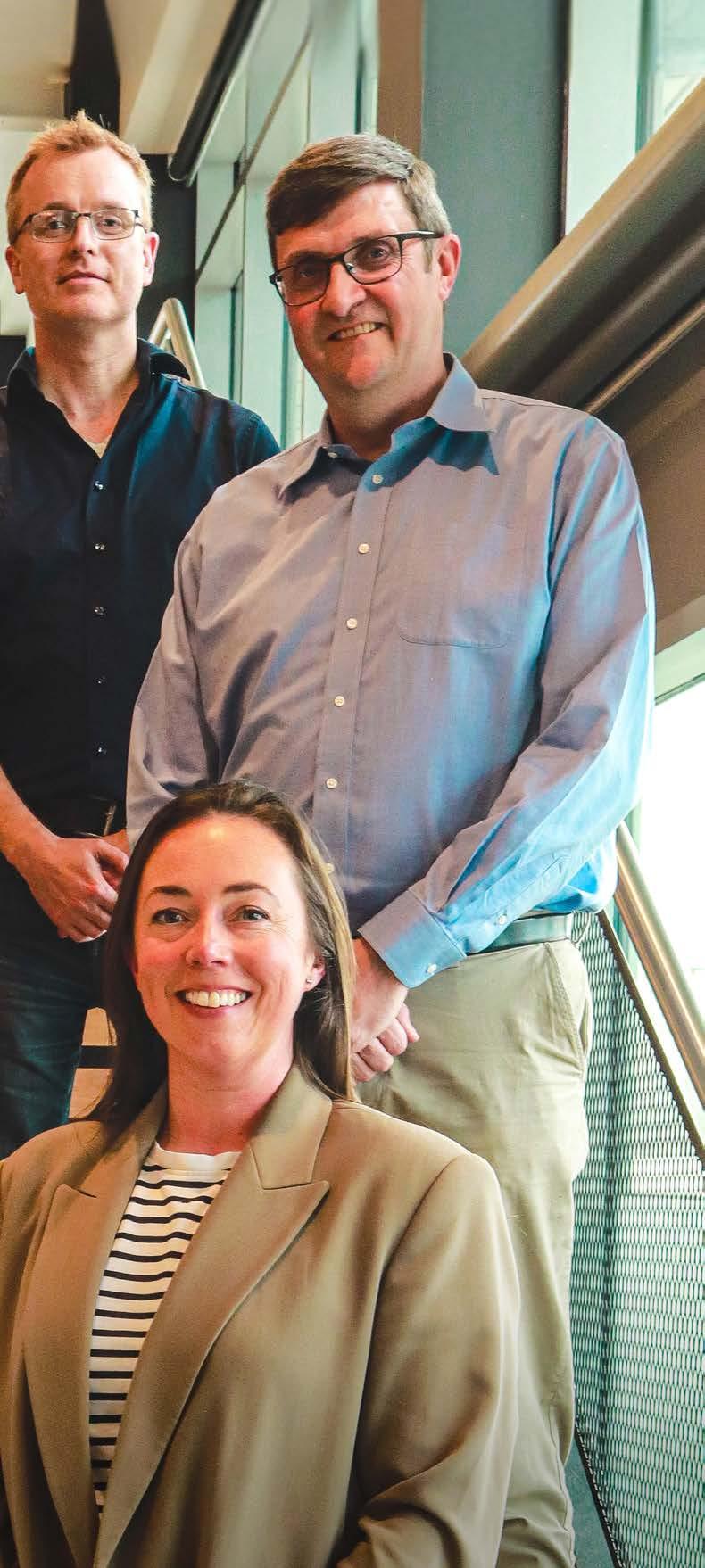
Sync NI invited a series of industry leaders to a roundtable event generously hosted at Rapid 7’s state-of-theart offices in Belfast city centre recently, where Kathryn McKenna posed a series of questions around American FDI’s who have set up in Belfast, all with inspiring results. Guests included:
Chris Wallace
Chris Wallace is the Director of People Strategy at Boston-based Rapid 7, and was the first seat on the ground when Rapid 7 set up in Belfast. Now marking its prestigious 10 year anniversary in Belfast this year, Chris continues to play a pivotal role in building and making the Northern Ireland team a resounding success.
Chris is passionate about leading the practice of HR management, system creation and project delivery aimed at maximising positive business outcomes and optimising employee engagement, to result in a highly successful business staffed with people who feel empowered, engaged, rewarded and valued.
At the forefront of network security, Rapid 7 has have been taking the hackers on at their own game and winning since their inception in 2000. Rapid 7 have expanded significantly in Belfast and currently occupy all eight floors of their modern Chichester Street office.
Russell Beggs
Russell Beggs is the Site Lead and Senior Vice-President of Engineering at ESO. As an experienced software engineering VP with a demonstrated history of delivering large-scale, technically innovative digital, IT and web-based solutions, Russell is passionate about technology and growing business.
ESO’s mission is to improve community health and safety through the power of
data. In fact, ESO stands for Emergency Services and Operations and it supports fire, emergency services and hospitals to make the most informed decisions when it comes to patient care, safety, efficiency and clinical improvements. Russell has previously stated his passion for working in a company with such an important mission “gets me up every morning”, adding “what we’re doing will leave a positive legacy on the world.”
The software company, which is based in Texas, selected Belfast as its first European base back in 2019 and Russell was an instrumental part in helping ESO become established in Northern Ireland. Russell counts building meaningful relationships with his team alongside nurturing and supporting local talent as one of the key things he enjoys in his role at ESO.
Alan Wilson
Alan Wilson is the Head of International Investment at Invest NI. Alan is an international business and technology leader with over 30 years delivering win-win solutions with customers across North America, Europe, Middle East and Asia.
Alan currently leads Invest NI’s Foreign Direct Investment team - attracting innovative investments across sectors including software and communications technologies, financial, legal and professional services, life and health sciences, green tech and advanced manufacturing and engineering.
Alan was also Head of Trade for two years assisting first time and experienced exporters to appoint dealers and distributors and to win direct contracts in overseas markets.
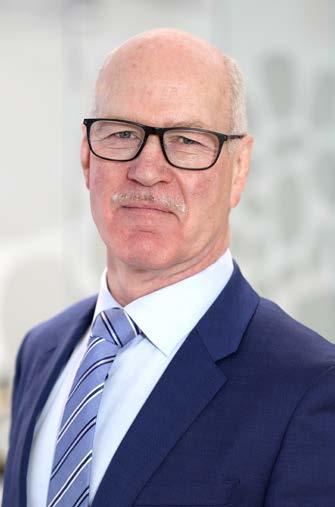
companion, My Special Aflac Duck for children ages three and up who have cancer to symbolise that these young patients and their families are not alone. The results of a recently released, 3-year independent study on the effectiveness of My Special Aflac Duck, conducted at 8 U.S. hospitals found that it has had a significant impact on children and parents in terms of stress and anxiety reductions. In partnership with Children’s Cancer Unit Charity, Aflac Northern Ireland has committed to provide this robotic companion to paediatric cancer patients, free of charge.
Victoria Milhench
Sarah Milliken is the Head of Talent and Culture at Aflac Northern Ireland.
As the Head of Talent and Culture at
Aflac NI, Sarah is responsible for owning and leading the strategy for talent acquisition and creating an enviable culture that helps to differentiate Aflac Northern Ireland in the market. Sarah works as part of the leadership team to align the strategy with Aflac NI’s organisational goals, developing the brand presence locally, and leads on marketing activities.
Sarah also guides the culture for Aflac NI, ensuring that Aflac NI upholds Aflac’s values, celebrates achievements, and supports employees' well-being and development. Additionally, Sarah champions the Aflac NI agenda around philanthropy, and leverages her expertise in talent acquisition and culture to recruit and retain top talent from various backgrounds and perspectives.
Though Aflac has been around since 1955, it wasn’t until 2000 that the Aflac Duck became a part of the family. Since then, the duck has been both a brand icon as well as a symbol of Aflac’s support of children fighting cancer. And now, he’s comforting the children of Northern Ireland, with the cuddly,
Victoria Milhench is the Europe Director of Marketing at Applied Systems. Victoria leads the marketing and communications strategy in Europe to support the delivery of strategic goals for the global insurance broker software company.
In 2016, Applied Systems acquired Relay Software, the leading software provider for insurers and brokers in Ireland. The acquisition expanded Applied System’s international footprint, strengthening its position in the US, Canada and the United States. Applied Systems Europe opened its new office in Belfast in March 2022 which was said to mark a "significant milestone" for Applied as the business continues to expand its presence in Northern Ireland.
Tom Keating
Tom Keating is the VP, Essentials and Belfast Site Lead at Proofpoint. Tom holds over 30 years of diverse IT industry experience and successful experience as a senior manager with responsibility for organisation setup, strategic planning, technology / security strategies and planning, business plan development, product development, customer relationship management and organisational budgets.
Tom also possesses a proven track record of success in software product
development / engineering, technology research, vendor management, data centre management, service management, professional services, PMO, change management and IT management within the international software, cybersecurity and financial industry.
Proofpoint is a global cybersecurity company that helps protect people, data, and brands against cyber attacks. They offer compliance and cybersecurity solutions for email, web, cloud, and more. Their Northern Ireland office is located in Belfast’s Weavers Court business park, making it one of their largest locations outside the US.
What are the key attractions of Northern Ireland and Belfast in particular as location for establishing a business?
Chris Wallace: “Rapid 7 has been here now for 10 years. And whenever I first met with Rapid 7 back in 2013, they had been informed by Invest NI about the quality of education in Northern Ireland, and about the enthusiasm and the willingness of the universities to form relationships with companies that were coming to set up over here.
“When I was hired, it was time for me to find out, was that true? And I think it is one of the real plus points of Northern Ireland that our standard of education is very good. In my experience, as the first seat on the ground here for Rapid 7, was that the universities were so willing to understand what the company was about; promote the company; and almost be our voice and our brand at a point in time when we had none. I think that was a really key thing.
“Of course, then there are the things that I'm sure everyone would know, which is Northern Ireland has had a really strong tech community for a long time. Certainly, these days, it's increasingly a cybersecurity hub globally, which really helps companies in
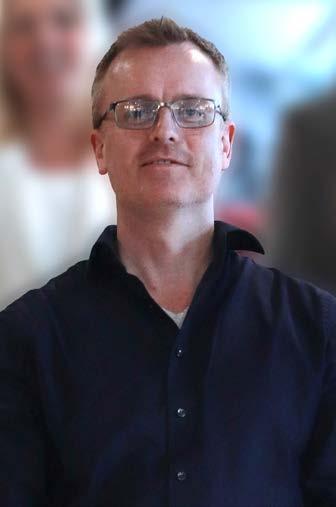 Wallace Director of People Strategy at Rapid 7
Wallace Director of People Strategy at Rapid 7
the same line of work as Rapid 7.
“Lastly, I think there is also a really strong entrepreneurial spirit amongst people here. Certainly, what I found was, there was a sizable enough community of engineers here who were willing to take a chance on something, to be a part of something exciting.”
Alan Wilson: “Just to tie in with the Rapid 7 story, I was involved in leading the Rapid 7 investment before it came to Belfast, working with our Boston office and on our cybersecurity strategy before that.
“If we go right back to 2001, the strategy for developing the sector was challenged because Northern Ireland still had the image of ‘The Troubles’ from over 20 years ago.
“So, the challenge in my mind, was how could we change this image and differentiate ourselves. It was really about recognising our really smart people. Northern Ireland had the strongest GCSE and A-Level results across the UK. It’s the number one region, every year, from then to the present day.
“The focus for us at that time was on product development and high-end services companies that paid good salaries and required well educated talent.
“When you build a product, that means you're dealing with the requirements specification upfront, you're dealing with product management, you're doing the ideation and design. So, it's a much, much richer, high value engagement and experience. And then you're able to build products and high-end services that have all aspect thought through - not only to deliver the business functionality, but at high performance, global scale and with built in security.
“We have a huge amount of people in Northern Ireland who are highly skilled in terms of product ideation, design, development and most importantly delivery and that's why Northern Ireland remains attractive across our key sectors.
“Northern Ireland is the number one location for cybersecurity for US investors – and that's quite impressive.”
Russell Beggs: “The interesting thing for ESO is, we are a relative blow-in when it comes to FDI, compared to the likes of Rapid 7, who've been here for 10 years now, and we're getting to stand on the shoulder of giants as a result of that. After ESO had tried to expand into the international arena in terms of talent, it hadn't gone particularly well when they were invited by Invest NI to come and see Northern Ireland.
“The big thing for ESO was the cultural dynamic. And like Alan just pointed out, the product-led development is exactly where we are now as an organisation.
“So, we started off by asking: “How do we get more engineers in another location and how do we grow and scale our engineering capability?” But it wasn't long after that, we started
getting product managers, product owners, product designers and getting the whole end-to-end solution for the organisation. And outside of the US, we are now the largest of our international locations. And I think a lot of that has to do with exactly what's been talked about here, it's the talent and it's about developing for the future.”
Sarah Milliken: “I would follow on from what Russell had said in terms of, we've had the giants to help lead the way before us.
“It's a really strong proposition when Invest NI comes to American organisations and says, “Look at who's been there before you and paved that way,” and that was part of the attraction.
“You know, there was 15 different European cities that were looked at before Aflac landed on Belfast, so it wasn't that we took that decision lightly. We're only the third global location for Aflac. So it's US, Japan and Northern Ireland. That decision was really helped by Invest NI and helped by the showcasing of going to meet the teams at Citi and Liberty and hear their story.
“For us, it's definitely who’s paved the way. It’s the culture and also accessibility as well in terms of time zone. But primarily for us, the access to education and the fantastic talent that's produced here played a pivotal role.”
Victoria Milhench: “Applied Systems has been here for about eight years.
“And we would certainly agree with everything that has already been discussed and I think the other thing I find is, that the fact that we are a small microcosm actually means we can draw on so many different talent pools and from a collaboration point of view, that works really well for us.
“On a really practical matter, although
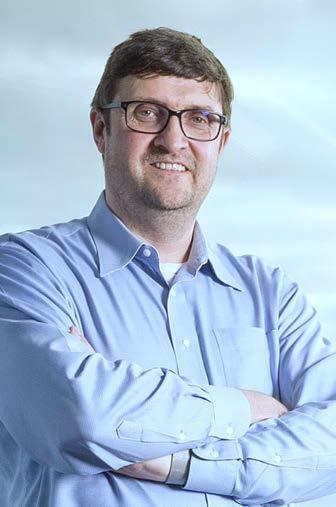
Northern Ireland is small, traveling extensively to the UK, Europe or the US, is relatively easy. Using Northern Ireland as a base into both Ireland and the UK, for us has been really beneficial. At the moment, we are using Northern Ireland as a hub. We have an office in England, but actually in Northern Ireland, we're finding it so easy for the team to get to and that's a soft added advantage, on top of the very specific skill-set ones.”
Tom Keating: “The biggest positive are the people here, they have such a positive work and ‘can-do’ attitude. We find that there's less talk about doing and more doing, it’s just the way people are here. Proofpoint have been here for over 10 years also, we came through an acquisition of a local, indigenous business and have continued to grow our site as a result of this.
“We could have been your classic FDI company that acquired a local business and continued in the same way, but we realised, we could do more here. Part of this reason was InvestNI’s help, they showed us that we could more than just product development/engineering. Two big areas we expanded into were
Operations and Customer Support servicing the need of our customers worldwide.
“The other attraction, which is very good from the US corporation point of view, is tenure, people stay longer here. It's a cultural thing here in Northern Ireland if you are treated well and looked after, in the main, people will stay longer so the investment in people is brilliant - rather than the classic three years, you'll most probably get five to seven years, which is amazing!”
“In addition to that there is a good cyber security and technical ecosystem here with lots of different organisations which means there is a sizable pool of talented people. We started off as a small site but now we are one of the largest sites outside the United States delivering services and products across the world and that is all down to the people who work here.”
Chris Wallace: “It was the exact same experience with the senior leadership of Rapid 7, I think it is surprising to American companies how good the talent in Northern Ireland is. Like whenever Rapid7 set up, the mission to me was in three years time, we want to have 70 staff in Belfast. And they thought that that was very optimistic. And we had surpassed that number very comfortably in, say, a year and a half. And the thought at that upper level very quickly pivoted from that will be a location for us to that will be one of, if not the location. I think people are just really surprised when they actually see the output.”
How does Northern Ireland compare to other countries you currently have offices in, and does Belfast, and Northern Ireland as a whole, stand out for anything in particular?
Tom Keating: “The Belfast site punches well above its weight and delivers high quality products and service across the world to our customers. We can find
the qualified and experienced talent we need here plus having a site here in Northern Ireland is cost effective. We stand out as a site as we get stuff done, we add value and we deliver great service.”
Alan Wilson: “So when I talk to technology companies setting up here, getting established and executing on their products, one of the measures I hear quite a lot from NI site leads is the minimal number of defects in production.
“And the story from NI site leads was always ’Compared to our companies’ other locations around the world, we have minimal or no defects in production from our Northern Ireland team.’
“So that means the product gets stood up and almost never fails. That is a really important metric for companies. And that's why I talk about the NI ‘product mindset’ and the fact that we know how to build product that just works.”
Tom Keating: “There's a lot of smart people here. And that's the thing that I've been blown away by as a leader of the site. It is the staff that are here, and just that point - they're the reason why our customers stay with us.
“We recently had a big client of ours telling us in a review that they ‘love dealing with the team in Belfast.’
“Allowing us to be self-contained and take responsibility has been crucial.”
Chris Wallace: “From my perspective, I think technically the engineering staff in Northern Ireland can go toe to toe with engineering staff anywhere around the world. And I think that to the point that was mentioned there, giving people proper work to do and giving them ownership of things is so important. But I think that one of the things which has really stood Rapid 7 in really, really
good stead and other companies around the table, is the willingness of headquarters to give that location, autonomy, ownership, and the ability to have a lot of impact.
“I think those two things, the quality of the engineering, plus that exciting mission, are key to the recipe for success.”
Russell Beggs: “Tom really hit the nail on the head, the cost effectiveness is really important. And that's a very nuanced subject, because to your point, it is very cost-effective low cost, but you know, there are many other sites that you can get many more people at a different price point, but you will get a different output, different productivity and different quality levels.
“And I think that's also something that as leaders of this industry, we need to be mindful of as well. So the thing I think is a challenge to all of us around the table is how do we keep that moving forward and to make sure that that we don't lose sight of that thing that sets us apart and differentiates us.
“An interesting thing about ESO was it was started in Austin, Texas, which is a little bit different to the rest of Texas. Belfast is a little bit different to the rest of the UK and the rest of Ireland, it's a little unique thing. And other all our other sites tend to be a little bit far away from where the main capital city would be. And that talks to, what is our fabric? What is our culture and why Belfast is uniquely positioned. Belfast might not be as big as some of our other locations, but actually, that's something very special as well.”
Victoria Milhench: “I would build on that in terms of the relationship side of things. From a marketing point of view, we're marketing a global product and whilst it is a similar product with a similar use case to a similar audience, the market dynamics are different.
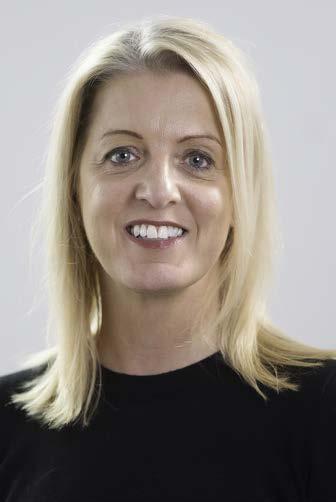 Victoria Milhench Europe Director of Marketing at Applied Systems
Victoria Milhench Europe Director of Marketing at Applied Systems
“What we find is that the relationship building with our clients and partners is a key differentiator for us and it is the world renowned welcoming culture and ‘can do’ attitude of the people of Northern Ireland that puts us streets ahead.
“I think that's a very unique attraction because we're there for the long haul with the customer and very much about building those relationships. And interestingly, we've had teams coming across from the US and they've been blown away by the relationships that we have, not just with customers, but with other stakeholders and other partners. They understand, even in this very digital world, it is really important to also get those face-to-face interactions. And that's something that by the very nature of being a small ecosystem in a central city location, gives us more opportunity. With the broad tech and business ecosystem across Ireland as a whole, we have tech giants on our doorstep.”
Sarah Milliken: “I think that relationship point is really key and one of the things that impresses our US executives
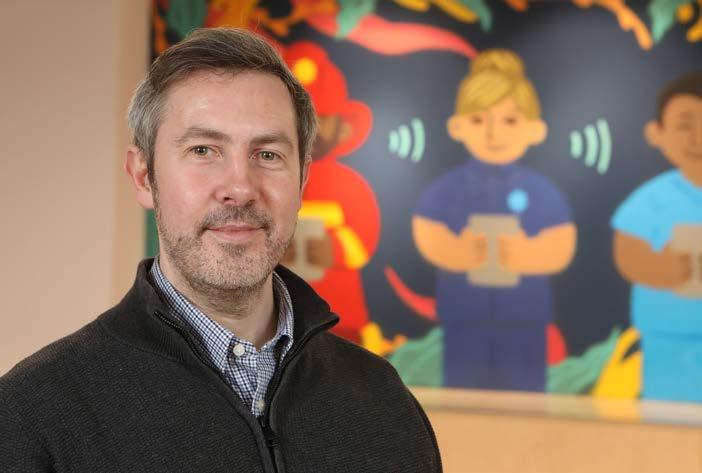
is the connection we have with the universities.
“How willing they are to work with you on curriculum and bringing you in as guest lecturers is so vital.
“The relationships that people are able to build upon here in Northern Ireland, absolutely sets us apart.”
When working across multiple locations, with different time zones, of course, how do you build team morale? And that all-important company ethos?
Russell Beggs: “One of the things that we do, which seems counterintuitive, but it's important, is making sure teams can be self-contained and autonomous so they can work independently.
“And that doesn't actually create the connections back and forth. Because people are working, and there's the potential for silos to happen. And when you do that, then you need to be incredibly intentional about how you create the avenues for engagement and for cross-team and cross-department and cross-level interactions.
“A few of the things we therefore do, for instance, is every quarter we make sure we've got all of our senior leadership team across the globe, having these breakout sessions with approximately 10 people in them. They could be from completely different departments, completely different levels, and people that may have never met before, but it starts to build these interaction points. And I think there is a lot of agreement here today that relationships are the key thing that differentiate us. Sometimes that happens naturally, and it's a lot easier to do in person. But in lieu of having that in-person interaction you need to be very, very deliberate about how you build those connections.”
Victoria Milhench: “The multiple locations and multiple cultures are absolutely brilliant, and bring so much added value to our business, but as Russell says, ensuring you don't have silos and you don't have teams working independently, for us, it comes down to flexibility. You have to have a flexible approach. You've got to have the collaboration, and you've got to bring the team works together.
“Having an element of flexibility allows those cross functional teams the
opportunity to meet. Sometimes in a business planning and a business operational process, it's so regimented in terms of what you're trying to achieve, you actually need step out of that more formal engagement and take the opportunity to get to know your colleagues.
“We have a ‘fun budget,’ and it's very much about bringing in other teams and encouraging them to talk. It's a small example, and for it to be really effective you have to be quite intentional in terms of what you're trying to do with it.”
Tom Keating: ”Definitely autonomy in the sites is good married with very good communications. We do have to remind ourselves at times to honour the time zone differences for our team across the world when having meetings and so on.
“We have moved to a hybrid model so staff meet each other more and can collaborate better. While it has been a transition to go back into the office for us all since the pandemic, it has been overly received in a positive way and does help with morale and a sense of belonging to the organsiation and teams.”
Victoria Milhench: “It has to be an inherent part of the ethos, and it has to be at all levels. The leaders have to lead by example.”
Chris Wallace: “Technology helps, Zoom and Slack, and there's no, there's no substitute, obviously, for spending time together with individuals. So, if you can create those opportunities, the more opportunities you can create for people to work together, ideally, to meet from time to time, these things will all help. And then also, I think one of the things that I really observed is, you know, having that strong company culture and having that consistent DNA, thread throughout all of your locations.
“But then understanding and acknowledging that each of your individual locations will put their own flavour on the top of that. So like the DNA of all of Rapid 7’s offices, and our culture, is very consistent. For example, our Singapore office feels very different to our Melbourne office, which feels very different from our Reading office. Encouraging people to have a say in the culture of the space while being respectful of the culture around them is key.”
Sarah Milliken: “We were quite lucky in the sense of our timing worked to our advantage in helping with this. We launched in October 2019, and then lockdown happened in March 2020.
“So everyone was at home across the whole organisation globally due to the pandemic. Everyone was in their house, everyone was joining calls with their kids running around in the background! So for us, that was actually a really nice way to ground everyone and build those connections, because everyone was in the same position, dialling in from home. So that definitely worked to our advantage, trying to take some positives out of Covid19.
“Having our executives joining from their houses to welcome people and make sure we were all alright was nice. Little things like that, from a timing point of view, made it very personable.”
Chris Wallace: “Lockdown was a great leveller!”
Victoria Milhench: “Interestingly, we talk about people's wellbeing and the pros and cons of our new way of working. If colleagues are not coming on camera during team calls and they aren’t coming in and out of an office every day, it can be difficult to pick up on how they're doing and how they're coping with work.
“So being really mindful of that, we have tried to instil that ethos of cameras
being on during video calls. I think we've all agreed it's actually really important for the wellbeing of the of the teams.”
Tom Keating: “I think that is a really important point when considering the importance of mental health. I think now we’re getting people back into the office it has helped, people are reconnecting.
“It is back to the importance of human connection that we forgot about and we took for granted.”
As a business, what strategies are crucial in attracting and also retaining top talent?
Sarah Milliken: “For us, one of our value propositions is; we do serious work, but we don't take ourselves too seriously.
“We talk about creating an environment where you know what, it's okay if things break, fail, that's fine, you learn from it, just try not to make the same mistake twice…you move on. Some of the people we've brought in have been maybe with larger organisations where the environment wasn't as supportive. We're a team of 170, we're not huge, so creating a culture where people feel valued, they have opportunities to continuously learn, and they're challenged, but in a good, safe way.
“When we set up back in 2019 people couldn’t even say Aflac. We weren't making anything, we had no product here, we weren't selling anything in the market. So when recruiting top talent, it was really around the question of, ‘what are you going to get if you come and work for us?’
“As an organisation we are here to help and support you as you grow and develop in your career with us. Delivering on the promise from a retention point of view is important to us. We've had very low level of attrition in a really buoyant market, growing during COVID, and have brought people
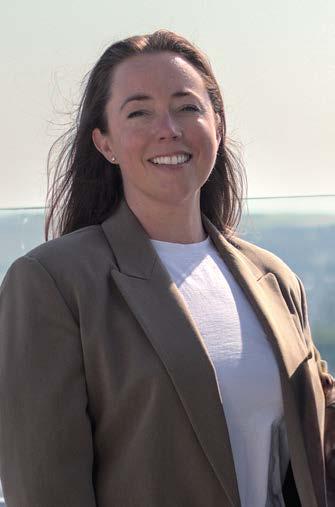
on during that time. I think that the proof is in the pudding, it is about delivering on those promises that you've made, because the market is small and everyone knows everyone. So reputation and company culture is really important.”
Chris Wallace: “I agree it is a small market. And as I've said to a few folk who've looked at Northern Ireland as a location, anyone that tells you that hiring is always easy, and that the streets are paved with engineers, there's more to it than that.
“I think that the things like the money and the benefits, obviously need to make sense. And nice work environment is going to help. But ultimately, I think some of the things we touched on here are the real key things in attracting and especially retaining staff, which are: Is the work interesting? Is it an exciting mission that I want to buy into and get behind? Is the culture here one that resonates well with me, do I feel supported? Do I feel like I'm working with people who want to see me be successful and who I want to assist in being successful as well?
“There can be a lot of window dressing that might help get bodies in through the door, but what keeps people is the meatier stuff.”
Russell Beggs: “I think that's right. I think it comes down to what are superficial and what are the intrinsic motivators for people. We were talking about, ‘why is Belfast an attractive proposition for companies?’
It is because people are talented and they want to do hard work and they want to be able to problem solve, they need to be able to do that.
“They need to be able to be stretched and to grow and feel like they're being supported in that, because to me, one of the key things is that challenge. Sometimes you might see people leave the organisation, and that's okay, if they've grown, and they've gone on to a bigger challenge elsewhere. You want to support that.
“I think historically in somewhere like Northern Ireland we might want to keep people as much as possible, but if we look at the bigger picture, we're all in the same boat here. As long as the talent here grows and develops, that's going to continue to help us be attractive to foreign direct investment and support indigenous investment as well. And indigenous innovation, too.”
Victoria Milhench: “I think that's an important point as well, in terms of growth - people need to see that they can grow within the organisation, and if there's a strong industry, and supporting industries around that, then they can see an opportunity there.
“That is reflected in the amount of talent within Northern Ireland. Trying to maintain that is really important.”
Tom Keating: “I do think hiring is probably the easiest thing. It is retaining that is the biggest challenge and a task you need to work on constantly.
“Candidates need to like what they're going to be doing, feel they’ll be supported, feel they’ll be empowered, feel valued and enjoy working with the people they are going to be working with every day. We like to harness the “Northern Ireland edge”, and what I mean by that is the entrepreneurial spirit, hard work, result orientated and professionalism. If you harness that, then you will be successful as a company/site.”
Victoria Milhench: “It’s important to come back to what you said, Russell, at the start and Tom alluded to it there in terms of building up the ownership,
“They have to be able to see the vision. And there can't be a level of ‘That is as far as we're going to get, because the senior leadership team is based elsewhere.’ In terms of giving them the autonomy, and the ownership to actually lead that part of the business, or to see where that part of the business is going is also really important too and, it's almost self-perpetuating as that sector grows, then there are more opportunities, and there's more opportunities across the industry.”
How do you ensure diversity and inclusion in the workplace, as well as embracing different cultures?
Tom Keating: “I'm involved in one our diversity groups, and we've made a conscious effort on actually educating people around the diversity, equality and inclusion as well as autism awareness. I’m the executive sponsor for the disabilities, allies and caregivers groups.,
“What we at Proofpoint have done is help educate people to understand the differences and understand things about themselves. Because whether we all like it or not, we all have the classic unconscious bias.
“It was great that they did that throughout Proofpoint, to let people be
aware of these things. It wasn't just a ‘tick-box’ exercise and I think that's key.”
Chris Wallace: “I am sure for everyone on the table, every company, diversity and inclusion is an extremely important thing. I think one of the things that's really important is for it to be clear why it is a very important thing. That needs to be very well communicated and very well understood, and so that it doesn't feel like it's some sort of ‘tick-box’ exercise.
“But rather, you know, it's really important for us and I’m sure all the people around the table, that the company's position is really important for us to have diversity of thought. We want to be holistic in how we approach things, we want to get as many voices as possible. Diversity of thought is really what we are trying to address. And it so happens that one of the really valuable ways of getting diversity of thought is including lots of different voices and perspectives, whether that be folks who are neurodiverse, or gender, and more.
“So having folks understand the why behind it, which is a really cliched expression, but having folks understand why it's important thing is key in terms of getting that buy-in.’”
Sarah Milliken: “We ask the team frequently as well. We ask, ‘what do you want us to do more of, what do you want to see more of?’
“Actually, one of the things that came back that was really interesting, which we implemented, was around the traditional bank holiday versus the annual leave model. Feedback from the team said that a lot of the traditional bank holidays fall around Christian holidays. So, from a diversity perspective, particularly around religion, we wanted to avoid automatically puting everybody into one box. So we just grouped our holidays together, no set ‘bank holidays’ to take, you have a lump sum allocation and you take them
to suit your own needs. It was really simple, but if we hadn't of asked the team, we might not have thought of that.
“Sometimes you can get overwhelmed whenever you start to talk about DE&I, particularly as a smaller organisation, because you can't do it all. So it’s about being really clear with the ‘why’ and articulating the reasons whilst still allowing the space and the voice for people to come with other ideas and suggestions. And it doesn’t hurt that Aflac Incorporated, which consists of Aflac U.S., Aflac Japan, Aflac Global Investments and Aflac NI sets a tone at the top that diversity is a good thing for the business.”
Victoria Milhench: “Ultimately I feel it almost becomes second nature. There has been a really significant focus on it at the minute and there has been in the past number of years, and I think it is really important to understand why you're doing it and the benefits to the broader team.”
Russell Beggs: “I've been fortunate because we've got a Chief People Officer who's very good at this and is open to doing things that will make a big difference and make a big impact. So when we think about, you know, paternity, maternity leave, what does that look like? And what is the modern world look like? In terms of who is looking after the children and therefore what leave should they get and how do we equalise that? I think those sorts of initiatives are really important and to get a different lens on those challenges and question, how do we tackle these things head on and make a change about them?
“I think about, how much more can we do? Are we doing enough? I look at things like the statistics, and somehow, we are above the industry average in what we do and yet I look internally and think, we can do more, there's so much more. I've got two young daughters, I
think about their future, and how do I as a leader in this moment in time, make a bigger difference than we're currently making.
“I think that goes back to what was previously mentioned, in that there are so many things you can do. That's definitely one lens, I think about. But also, how much more can we do, as leaders, holding ourselves to that high bar and holding our fellow industry leaders to the high bar to make sure that this is a focus and a priority.”
Tom Keating: “Going back to the Autism Awareness, the reason why I initially got involved was because I know my daughter is on the spectrum. I didn’t understand it at first but now I do. Having that awareness and being able to have conversations as well as being open about it has been great and gets people to realise they are not alone with similar challenges, as they say, it is good to talk and share ideas.”
Victoria Milhench: “It comes full circle then, in terms of building that all important company ethos in different time zones and different locations. Coming back to your point, it's really important because it actually builds that company ethos and cements it all together. And gives people an opportunity rather than just sitting on a zoom call talking about what products they're working on. There's another talking point there for them. There's another area of interest where they can bring diverse groups of people together.”
Have there been any specific examples of positive experiences from establishing a business in Belfast, or Northern Ireland as a whole, that you have been able to implement in other locations?
Chris Wallace: “Belfast has been a real success story for Rapid 7, and much more of a focus area than the company ever thought. And as a result of that, our intern program in particular has set
the standard across the whole company of how we think about early career development.
“We have other engineering offices, including Dublin, and Galway, and Prague. And in all of those locations, we are looking to what has been so successful in Belfast as we think about growing and scaling those locations as well. The intern program has been intrinsic to Rapid 7’s success in Belfast and that is something we are currently replicating in Prague and Dublin.”
Tom Keating: “Proofpoint have been able to hire a lot of smart people that have been empowered to develop highly productive and cohesive teams made up of all key components, engineering, architecture, product management, QA, DevOps and program management.
“This has been recognised as the best way to deliver a high quality product and service to our customer with clear management of expectation which is now being sought to be replicated in other sites.”
Russell Beggs: “The High Performance Entry Level Programme, which we started in Belfast, is now being rolled out to other locations because of its success, similarly to Rapid 7’s intern programme.
“And then on the engineering side, and product, actually; I'm very fortunate to have recently been promoted into the C suite for ESO, which shows the strategic importance of Belfast as a location. And it's got more engineers than any other locations. But equally, our head of UX and design is based in Belfast as well. And a lot of the principles being developed here, are now making it across to North America as well.”
What support did you receive as a company setting up in Northern Ireland? And how vital was this for you as a company?
Alan Wilson: “At Invest NI, right from the start, we try to target investors that are going to be additional, who will offer something new to the economy, that is key. For example, in the cybersecurity space we did a gap analysis and matched that against the cyber top 100 by impact for our target list. i.e. the companies that were really impactful, not the big ones, but the impactful ones. One of the gaps identified was ‘open-source’ software, mind not in Northern Ireland as a whole, but specifically in cybersecurity. To that end we targeted the global leaders in open-source cybersecurity and were successful in attracting them to Northern Ireland. Gap filled.
“We do a lot of work in market with companies at an early-stage, to clearly understand what their real requirements are, and based on those requirements, we build a bespoke visit programme in Northern Ireland. And that's where the support comes in, we try to get very targeted support for what the company really needs. I would call it consultancy support rather than grant in the first instance. It's around introducing them to Queen’s and Ulster University, to the research centres, reference companies, lawyers, accountants, etc. So, if you like, there's a whole piece of soft, project enablement support we do up-front, which then continues during the set-up phase through to establishment – noting that almost 70% of investors re-invest in NI.
“A lot of what we do is project enablement rather than funding, however if the project is mobile / competitive, we can offer financial assistance towards the creation of the new jobs, skills development or research and also pre-employment training support through the Department for Economy Assured Skills programme.
“For example we can provide funding against a training plan for the first
two years of getting established and a customer can come back after two years and say, “Okay, we did that and now we need to train up in AI now,” and then we can then help with that too.
“However, the one that grabs the headlines is ‘how much of a grant did you get?’ To us, it's no longer a really strong metric, because we see the companies come here for the overall value proposition.
“Another incentive is research and development funding. So, if you've an existing product and you want to make the next gen product, then you can come to us. We can provide research and development funding in addition to an investors ability to take advantage of R&D tax credits. It used to be just Invest NI, but much more so we work with Innovate UK and look for bespoke funding from broader sources too.”
Chris Wallace: “That is such a good point that Alan makes, because if I think back to a point in time in 2014, and at this stage, Rapid 7 had committed to being in Belfast, but had yet to receive funding. In fact, we haven't even completed the application process for funding. And I remember talking to one of the executives at the time, and asking: “If the funding doesn't come through, what does that mean?’
“And the response was: “Honestly, Chris, funding is an avenue. And of course, we will avail of that avenue because it will assist us.” But to Alan's point about all of those sort of consulting services upfront at that point in time, we are confident enough in this as a location so that whether the funding is there or not, we are committed to doing this thing in Northern Ireland.
“So much of what Invest NI does is in helping potential companies and potential employers understand what the ecosystem is like, and selling the opportunity of being in Northern Ireland. And to all of that, funding – to put it
crudely – is just the icing on the cake.”
Tom Keating: “When Proofpoint came to Northern Ireland back in 2013, we did so via an acquisition of a small indigenous company, it could have just ended there with the Product being developed with a small engineering team and nothing more but with the help of Invest NI they opened up the opportunities for us to expand our footprint beyond just engineering to operations, product management, PMO, customer support, finance, professional services, HR, Recruitment, IT and GIS groups. This has allowed us to grow a significant site here in Northern Ireland for Proofpoint with a critical mass of some great local talent.
“It’s fair to say that the advice, employment and R&D grants from InvestNI has really help build and grow our site. Proofpoint’s site here has been a great success for us and are continuing to build on that success now.”
Russell Beggs: “I 100 per cent agree. Establishing our engineering hub in Northern Ireland was a logical move for ESO and as I mentioned earlier, a strategic decision driven by our recognition of the region's talent pool. But whilst the decision was informed by this, our integration couldn’t have been made possible without the support extended to us by Invest NI. From initial funding to consultancy, collaboration and the partnerships extended to us which most importantly gave us all to all the region has to offer - and you simply can’t put a price on that.”
Sarah Milliken: “Yes, one of the really useful things which Alan mentioned earlier and we talked about at length, is relationships.
“We could have lifted all of the relationships we had from the US and used them here, but intentionally,
we wanted to be part of the local ecosystem. From our relationships with local solicitors to the accountants to the property, and even where we've ended up with our office right in the Harbour Estate we wouldn't have had that had it not been for that support from Invest NI but also Aflac. Aflac take the same position with Aflac Japan, in that even though Aflac Inc. is a U.S. company, they see great value in Japanese people running the operations in Japan. I think it's probably downplayed that soft support, but actually, that's really critical to embed in the ecosystem. We now talk about how it's been a ‘farm to fork’ evolution in terms of what we've set up here, because all of our relationships are local and that is really important.”
Are there any initiatives or programs that would help to further support FDI businesses have established an office in Northern Ireland?
Tom Keating: “Invest NI are a great support to all FDI in Northern Ireland, I think they should, after the initial contact/setup stay in close contact with existing FDIs to be updated on expansion opportunities such that they can support these opportunities with a view to encourage them to be brought to Northern Ireland rather than get moved to other geographical locations.
“In addition to that, a focus on STEM for schools kids and AL/ ML technologies events are key to growing the potential candidates for organisations.”
Russell Beggs: “Absolutely, I think collaboration is paramount. And in addition to tapping into organisation such as Invest NI looking to local universities which allow us to tap into their research prowess and access skilled graduates – it’s not just about hiring talent, but fostering a culture of innovation. Networking is equally crucial. Engaging with local stakeholders and industry
peers. It's through these networks that opportunities often arise, be it partnerships, investment leads, or valuable insights and by pooling resources and expertise, we can tackle common challenges more effectively and explore new avenues for growth.”
Chris Wallace: “I know we spoke a little bit earlier about the diversity in the north, because I have no doubt that there are lots of things happening to further promote STEM as an avenue to young kids in schools between the ages of eight and 16. But as much as can be done to promote tech careers, STEM subjects is of great importance.
“STEM subjects and tech as a whole is still quite a male-centric course of study, so whatever can be done to feed the top of that funnel in terms of interest and promotion, can only be a good thing for all of us.
“Better transport links would also be a good thing. It is optically challenging, if not logistically challenging, for people to land in Dublin who want your business and then travel up to Belfast.”
Which skills pathways have you found best suit your hiring needs here in Northern Ireland. How does the quality of the talent pool compare to other office locations and how would you like to see that evolve in the coming years?
Tom Keating: “I think we need to talk to primary level children, about the potential options in technology and cyber security, I feel we as leaders should focus on going into schools, showing the potential opportunities and also have them to meet some role models.
“The EmPower Girls event recently held in Winsor Park was a great example of this, it was great for many of those school girls meet and speak with female leaders in tech / cyber security and help eliminates those thoughts of
‘Oh, I couldn’t do that.’ It is a long-term problem for us all but I think you will find if we put more time into this then more kids will think about going into Technical / Cyber Security careers and you may find more women going into tech.”
Chris Wallace: “I think if you are optimally getting in front of primary school children then it is a long game. It will be in 12 years’ time that this will pay off. It is hard to commit to that when the payoff is so far in the distance – and yet, it is such an important thing.”
Victoria Milhench: “When I consider my own children I think there is still very much a focus on a lot of the traditional subjects. I have three children, all of whom have different interests and strengths, and none of them have gone into this industry and I believe that is indicative of a really big challenge that has to come with a supportive industry – but which also needs to be supported at a central level.”
Sarah Milliken: “I agree, I think it is about the consistency of teaching, as well.”
Victoria Milhench: “It’s like any career, you might start off in one aspect of it, and over time it becomes clear how technology helps make it even more innovative and exciting and ultimately helping us live our lives.”
Russell Beggs: “I have to agree with Tom, there’s no longer just one route to employment and it needs to start with educating people on their options. At ESO, we find diverse skills pathways vital for hiring and have found real value in candidates with varied backgrounds and experience.
“This approach not only enriches the team with a multitude of perspectives but also fosters creativity and innovation, which is a huge driver for our mission in empowering emergency services.”
CME Group's Joanne Ferguson tells Kathryn McKenna about her passion for inspiring more young women to pursue a career in STEM and why it is “crucial to break the cycle” and “be
the change we want to see in the world
q As a female leader in the industry, can you talk us through when you first realised you wished to pursue a career in the technology sector and your career path to date?
“I was a nerd at school. I went to Victoria College Belfast, an all-girls' school, and my A Levels were Maths, Further Maths, Physics and Chemistry. I enjoyed the clarity of producing a resolution to a problem, balancing an equation or providing a physical interface to complete a task. I loved fixing things and understanding how they worked.
“It was therefore a natural choice for me to study Electrical and Electronic Engineering at Queen’s University Belfast, one of less than 10 females in a class of over 100. After graduation, my first role was as a telecoms engineer.
“From there, I moved into Computer Telephony Integration, specialising in telephony billing, telephony product management, and compliance.
“I joined Citibank, Belfast in June 2005 as one of the first 17 staff members, where I worked for seven years in Technology Infrastructure programme management.
“I moved to CME Group in 2012, as one of the first employees there, too. CME Group is the world’s leading derivatives marketplace, providing the widest range of global benchmark products across all major asset classes. Our exchanges offer trading in interest rates, equity indexes, foreign exchange, energy, agricultural products and metals.
“The Belfast office was established 12 years ago, and we now have around 370 members of staff, with 80 per cent in technology. Other teams include accounting and finance, legal, online marketing, clearing, anti-money-laundering and HR.”
q You are a STEM Ambassador and SistersIN mentor alongside the vital work you do as Early Career Lead for the CME Group. You must be extremely passionate about increasing the representation of women in STEM. How important is it to reach out to female students at a young age to help educate them and inform them about the career paths available in STEM?
“I am a single mum to a 16-year-old daughter, and a 14-yearold son. Ensuring they are both fully informed of the career

“Having low of females repetitive cycle to be dealt
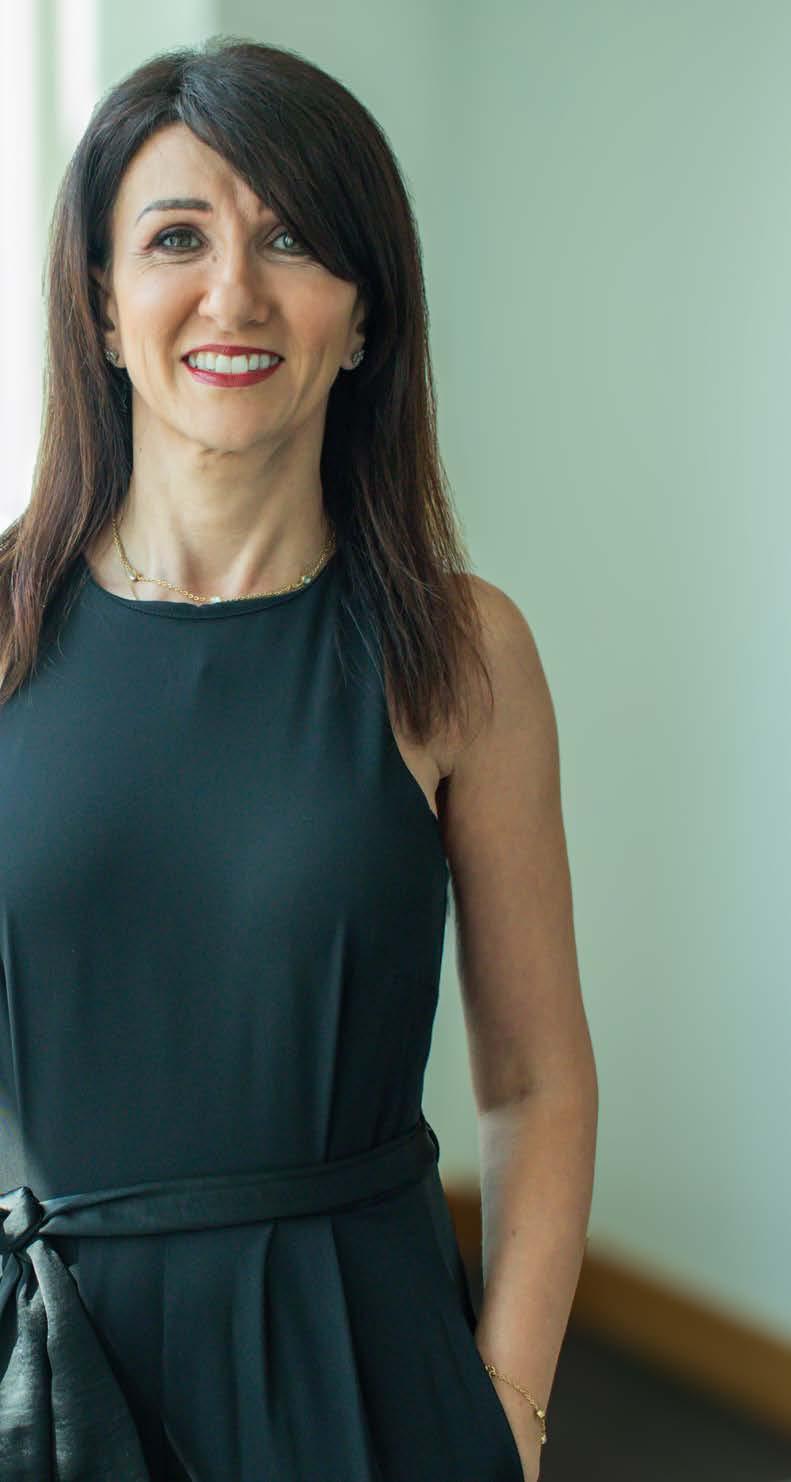
opportunities available is an important priority to me and a driver for my passion to encourage women in STEM.
“Having low numbers of females in STEM is a repetitive cycle that needs to be dealt with. In organisations where the male/female ratio in technology roles is 50/50, that normalises the role models and there is no perception that it is ‘unusual’ to take on a STEM role because of your perceived gender. This permits the ratio to be maintained.
“In CME Group in Belfast, we are fortunate to have a senior management team that is (almost) evenly split with five females and four males, across all departments.
“Here in Northern Ireland, that ratio is much lower, around 22 per cent, so inspiring more young women in STEM careers is crucial to break the cycle. One way to do this is to encourage young people to take interest in the technology they interact with every day.
“A large proportion of young people who are attracted into the technology industry are inspired because they enjoy video games. It can be a gateway, encouraging them to learn more, find out how the technology works, and figure out how to do it better.
“We should be showing young people how the applications they use every day work. This inspires their creativity to create their own app and understand the commonality across many platforms of a secure logon, connectivity, a user interface to a database, and manipulation of that data to be presented as an output in a desired format.”
q The work SistersIN does in terms of mentoring young pupils is inspiring. With young girls previously stating a lack of female role models in the technology sector as one reason why they may not be encouraged to pursue it as a career,
how important is it for young girls to see females in leadership positions in tech?
“SistersIN is a fantastic initiative to support females in Year 13 in preparing, developing and defining the skills required for employment, however it really needs to start much earlier.
“The role modelling needs to show young girls that “having it all” is actually possible. We need to have more positive role models for young girls to show them the fun and varied opportunities that are available in STEM. Organisations need to visit schools to demonstrate the entrepreneurship and leadership of successful women in Northern Ireland.
“Often, STEM roles are perceived as individual contributor ones, where the task involves sitting alone at a computer or in a lab. That characterisation isn’t accurate, and it can dissuade those who want more of a collaborative or team role.
“In reality, there are very few jobs where sole contribution is actually the case. The majority of roles are team based, and this is something that we need to communicate through project work in schools and universities.
“At CME Group in Belfast, we have a group of successful women, from intern to director level, who have presented in girls’ schools, demonstrating their path to success, telling their story and how they’d advise their 16-year-old self. In education, all of the focus is on the subject knowledge of the individual and proving their level of memory and understanding of that subject. This is key for a foundational knowledge.
“However, in industry, skills of communication, problem solving, negotiation, mediation, organisation, leadership, creativity, and presentations are all vital to deliver a completed project. University group projects can be unrealistic because often they are
based on a group of students from the same class, with the same experience. In real life, this is rarely the case.
“With CME Group’s university partnerships, I am hoping to influence change to permit cross faculty project teams, to deliver genuine solutions to university needs. Also, the project team could be made up of students from different years, so that leadership skills can be established from early in their career.”
q CME Group runs fantastic diversity and inclusion initiatives which run both locally and at a global level. Can you tell us a bit about why they are so vitally important and some first-hand accounts of the type of talent and successful candidates these initiatives produce?
“CME Group has 11 different D&I Employee Resource Groups (ERGs). Our Employee Resource Groups consist of employees who come together around a common mission and reflect a particular dimension of diversity (such as gender, ethnicity, sexual orientation, generation and professional level, life situation, etc.) or special interest.
“Participation is encouraged and open to all employees. Employee Resource Groups can be mutually beneficial for CME Group, employees and the community.
They are:
q Black Organisation for Leadership and Development - BOLD
q Connecting Asia Network - CAN
q Differently Abled Workforce Network - DAWN
q Fulfilment, Lifestyle, Openness and Wellness - FLOW
q Hispanics Organising for Leadership and Achievement - HOLA
q Promoting, Rights, Inclusion, Diversity and Equality EmployeePRIDE
q Sustain and Enhance our Environmental Direction - SEED
q Service Members and Veterans -

SERVE
q Women's Initiative Network - WIN
q Women In Technology - WIT
q Careers - LAUNCH
“The groups work together on mentoring, presentations, activities, newsletters, events, book clubs, often collaborating across groups with a common purpose.
“Personally, I am involved with seven of these groups. I am also on associate boards and act as a global mentor. It is a fantastic way to become involved with a global network of like-minded individuals, and to be supported to bring your authentic self to work and celebrate the unique qualities that make you who you are.”
q CME Group is home to outstanding award-winning early careers programmes, from the Higher Level Apprenticeship scheme, Intern and Graduate level. Can you tell us a bit more about them?
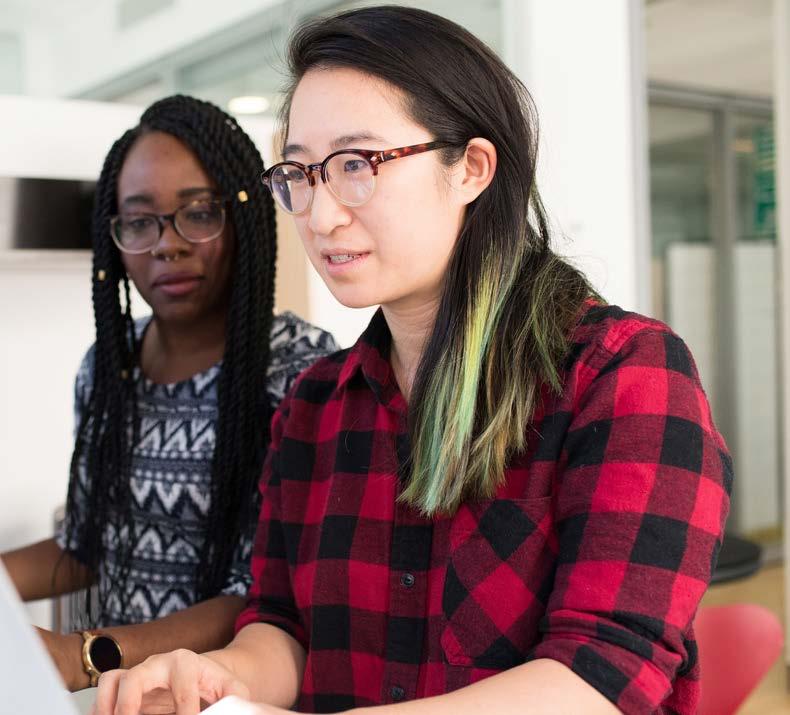
“Our first point of entry into CME Group’s early career program is straight from school or college, via our Apprenticeship Program.
“Apprenticeships are open to students in Year 14, studying the relevant subjects, with a passion for their chosen field.
“In 2023, our Technology Degree Apprenticeship was recognised with the Large Employer of the Year Award. It was fantastic to receive recognition for the programme which we have created in partnership with our own apprentices.
“Our apprentices are on six-month placements around all our technology teams, permitting them to have an insight into the diverse areas of the division that work together to provide our market leading technology solutions.
“I am the Industry Chair, in partnership
with Professor Jonathan Wallace from Ulster University’s School of Computing, for their Employer Advisory Board. I also sit on the Professional Advisory Board for EEECS at Queen’s University Belfast.
“I hold a position on the Board of Software NI, an industry group working with government and education to increase the awareness, opportunities and funding for the software industry in Northern Ireland.
“These roles permit me to help influence the curriculum and skills gap requirements for the technology industry in Northern Ireland, ensuring we retain the global respect we have earned for the high calibre of talent that our education system produces.
“At CME Group, we have been hosting interns on their placement year for 12 years. The intern positions are taken up early in second year for third year placement, so it’s those organised candidates who attend the October
recruitment fairs or apply early who are rewarded with the placement with us.
“These interns grow in confidence during the year, as they take on independent work and see their own efforts realised into applications and platforms used globally. We use the feedback from these interns, and industry peers, to further improve and shape the local university courses.
“This current year, our split of male/ female interns is almost 50/50, which is fantastic to see.
“Both the Apprentice and Intern Programmes are superb talent pipelines for our Graduate Programme.”
q The apprenticeship offered by CME Group, sees students study a Computing Systems BSc degree, part time, as well as working for CME Group up to four days a week. Having the course paid for and the ability to earn whilst learning must help to appeal to a more diverse applicant from different backgrounds. Can you tell us more about this and how interested applicants can help their application stand out?
“Apprenticeships are an amazing way to support a student through university. With no need for a part time job, apprentices learn from industry experts, gaining experience in a reputable company, all before graduation.
“In order to be shortlisted for an interview, the CV is the first opportunity to impress.
“That said, it’s certainly not all about academic results. Students need to demonstrate their genuine interest in computing through the activities they do outside school or college. This could be running the school computing club, writing gaming mods or hacks, upgrading their PC, or even creating their own apps or websites.
“They should also be able to five examples of collaboration, problem solving, organisational skills, independence, leadership etc. from their personal life through volunteering, part time jobs, clubs, competitions, groups or organisations.”
q It is amazing to see the work CME Group does with integrated schools, with the Integrated Education Fund recently posting on social media about the generous donation of “much needed” equipment recently which they say is “such a thoughtful and generous act that will benefit many schools and pupils.” It is fantastic to hear of such important work reaching out to the wider community. Would you tell us a bit more about this and other work CME Group does in the wider community?
“I believe that today, use of technology should be as important as numeracy and literacy, to enable equality of opportunity for personal and career development.
“This is one of the reasons that CME Group donates our end of life equipment to the Integrated Education Fund, for distribution to schools.
In the technology industry, our computers become end-of-life within a few years, as we move to faster and more powerful platforms to deal with the amount of data we handle.
“We’ve also donated other needed items like cables and recycling bins. CME Group has a number of STEM ambassadors, who volunteer at school initiatives from primary school upwards, to encourage an understanding of the fun opportunities available within STEM.
“A few years ago, the CME Group Foundation and some of our local
staff, in partnership with QUB EEECS, supported 150+ teachers to be trained in coding to help deliver the Digital Technology GCSE. This was a fantastic initiative, however there are still not enough skilled IT teachers available.
“Outside of education, CME Group has a Corporate Social Responsibility (CSR) team who organise events with local charities such as Air Ambulance and Action Mental Health. For example, on Earth Day, our team joined with the Belfast Linen Quarter to pick up litter in Belfast City Centre.
“Every CME Group employee has a paid volunteer day, which they can use to support the charity of their choice, and the company supports charities important to its employees through donation matching.”
q You are a clear example of a female in the industry achieving fantastic results and a powerful role model for young girls considering a career in STEM. What words of advice would you have for a young girl or student with a passion for STEM subjects who may be considering a career in the field, as well as those from a more diverse background?
“The more obvious question is why not? I don’t consider my gender in my daily role until it becomes obvious that my opinions are from a different perspective which may not have been considered, or when I’m the only one in a bright colour in a room of black suits!
“I would fully encourage any young person to go into a role in technology. You can join a global company, gain a really good salary, and will continually develop your skills for a lifetime.
Technology underpins all other industries, so the demand will only increase, as will the opportunities.
“Perhaps one other thing we need to expand is the mindset of parents in Northern Ireland. I am often asked by students how to influence parental
thinking.
“The term ‘apprenticeship’ is not always understood in the current mode of academic study alongside onthe-job knowledge transfer learning. Parents are often also of the opinion that the ‘best’ jobs are in law, medicine or accountancy, not realising that the salary and opportunities in technology can be similar - or better.
“During the talks that I do with schools on employability, my advice is to be able to demonstrate a passion for the area that you are interested in, because that energy will be obvious when you are interviewed. In most jobs you are provided with training to do the task, so you are not expected to know it all already.
q Find out how the industry has progressed.
q What is new?
q What are the current problems and proposed solutions in that field?
q Be able to talk confidently to demonstrate a genuine interest in the subject, not just what you’ve learnt in class at school, same as everyone else.
q A key takeaway would be to start changing their own algorithms on social media.
q Not by amending the actual code, (although we want to hire those people immediately!) but by following thought leaders in the field that you are interested in.
q Follow the company, a product, a group, a spokesperson, so that you absorb genuine current information by osmosis.
“There are no jobs for girls or jobs for boys, just jobs. One of my favourite ideas is Gandhi's: “Be the change you wish to see in the world”.
“Instead of complaining that there aren’t enough females in STEM, add to the numbers yourself or be an ally. Inspire and support others, until it is no longer a factor.”
Northern Ireland’s tech trailblazers were recognised and rewarded at the recent 2024 Women in Tech Awards.
Curated by Women in Business and sponsored by VANRATH, the annual event welcomed over 300 guests from across the tech sector to Belfast’s Europa Hotel for a gala evening to showcase the sector’s most inspirational individuals and their positive contribution to the local economy.
With Northern Ireland’s rising status as a major tech hub and Belfast recognised recently as the UK’s second fastest-growing knowledge economy, the 2024 Women in Tech Awards honoured eight women and one male advocate who together have challenged and embraced technology.
The Outstanding Woman in Tech 2024 award, sponsored by VANRATH, was presented to Clare McGrath, Creative Digital Technology Leader at St Malachy’s College Belfast.
The Women in Tech 2024 award winners are:
C Level Woman of the Year (sponsored by Expleo) q Alison McFadden (Continu)
Digital Transformation Leader of the Year (sponsored by Check Point)

q Samantha Kirk (Kainos)
Entrepreneur of the Year (sponsored by Allstate Northern Ireland) q Melanie Dawson (Origin7)
Tech Team of the Year (sponsored by EOS IT Solutions) q Team led by Catherine Maguire (Alfac NI)
One to Watch in the Future (sponsored by BT) q Hayley Rice (Danske Bank)
Green Impact Award (sponsored by Danske Bank) q Faye Thomas (Vyta)
Tech Advocate of the Year (sponsored by MHS) q Victoria Logan (Alfac NI)
Male Advocate of the Year
(sponsored by NIE Networks) q Killian O’Rawe (Reward Insight)
Outstanding Apprentice (sponsored by Version 1) q Elizabeth Murphy (PwC)
Outstanding Woman in Tech 2024 (sponsored by VANRATH) q Clare McGrath (St Malachy’s College, Belfast)
Lorraine Acheson, Managing Director of Women in Business, congratulated the winners: “Northern Ireland continues to punch above its weight on the tech frontier and at Women in Business we see first-hand the innovation and ingenuity fuelling that momentum. Tonight’s ceremony was all about showcasing that incredible talent and the achievements of women
locally in helping to rewrite industry perceptions across NI and beyond.
“On our doorstep is an excellent digital infrastructure energised by game-changing women who in their day-to-day contribution to the local economy are fast becoming role models for tomorrow’s tech leaders. On behalf of Women in Business, I wish to congratulate all of tonight’s winners and finalists.”
Barbara McKiernan, Managing Director at VANRATH, sponsors of the Outstanding Woman in Tech 2024, added: “VANRATH is proud to once again be the headline sponsor of the Women in Tech Awards. This continues to be a significant event dedicated to recognising the outstanding women who are shaping our local tech scene.
“As sponsors of the Outstanding Women in Tech category, we celebrate the exceptional winners, and all finalists, whose remarkable contributions continue to inspire and drive positive change within the industry. It's amazing to see these individuals being celebrated, their journeys are a testament to resilience and excellence, serving as a source of inspiration for all those who are committed to excelling in their fields."
Fueled by a passion for Diversity, Equity, and Inclusion (DEI), Michael's journey paints a vivid picture of the possibilities that exist for anyone seeking a rewarding career in IT
Here, Michael Loughan shares how he strikes the perfect balance between groundbreaking innovation and impactful community outreach, all while fostering an inclusive workspace for everyone.
q How did you start your journey with Liberty IT?
I always knew I wanted to pursue a career in IT, but I wasn’t sure what area I wanted to specialise in, so I decided to study Computer Science at Queen’s University Belfast to keep my options open.
My degree pathway included a placement year, and Liberty IT came highly recommended. I decided to apply for a role and was lucky enough to start June 2010. I absolutely loved it, so much so that I came back as an Associate Software Engineer in June 2012.
Since then, I’ve worked across a number of teams and engineering groups within Liberty IT which has allowed me to work and meet a variety of people across the organisation.
q What does the start of a typical day look like for you?
Once I’m all caught up with my e-mails and Teams
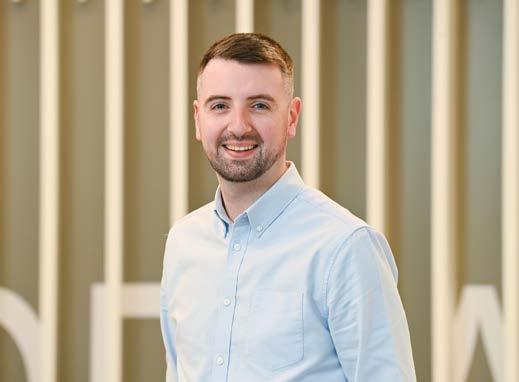
messages, I could be meeting with engineering teams to provide direction, share updates and assist with any blockers folks are facing.
I also meet with leaders to discuss our engineering group's direction and ensure we’re working collectively towards our company goals.
q How do your afternoons go?
Depending on where we’re at in a given sprint, I'll facilitate planning to define objectives and goals for upcoming work, or participate in a retro to review what went well during the sprint and how we can make improvements.
After lunch, our US teams are online, so afternoons are typically spent with our business stakeholders, discussing prioritisation and proposing solutions to
current pain points in their workflow.
q Can you share more about your DEI work?
Outside my day to day role, I have a passion for DEI and actively contribute to our Pride @ LIT employee resource group, helping make Liberty IT a safe, inclusive space for all.
One thing I really love about the Pride @ LIT group is that it formed organically, so it wasn't company mandated.
Over the years we have participated in Pride Parades in Belfast, Dublin and Galway, but really it was just a group of us that got together and said, "hey, should we do more?"
q What skills are most important in your working day?
In a hybrid working environment,
communication skills are key. It’s important to adapt my communication style to suit the audience and ensure everyone gets the most from the discussions we have.
Teamwork is also hugely important and I make a conscious effort to ensure I articulate ideas and provide meaningful direction. I also try to create space for others, to ensure everyone’s voice is heard.
q What do you enjoy most about your working day? This is an easy one: for me it has to be the people. I work with incredibly talented individuals and I thoroughly enjoy the discussions we have, the challenges we overcome and the insights we gain together. The people here are really inspiring and motivating, so this is by far the most rewarding part of my job - though our monthly Social Club events are always fun too!
q How do you ensure you have a good work-life balance?
Liberty IT offers a fantastic flexible working policy and it’s one I avail of by working nine slightly longer days in a row, which means I have every tenth day off as a ‘compressed’ day. This is a great perk and one I make full use of.


Sync NI is Northern Ireland’s leading technology-focused, multi-channel media platform combining Print, Digital, and Social Media to reach a captive audience of over 75,0000 local IT professionals and tech enthusiasts.